#batman 426
Explore tagged Tumblr posts
Text
a couple of common misconceptions i've seen about a Death in the Family.
(These are purely based on the og storyline, I can't speak on any adaptations or retcons)
-"Jason and Shiva canonically look enough alike for Jason to suspect she's his mother, even Bruce agreed it was possible"
Jason's suspicion of Shiva had nothing to do with looks. Jason had found his birth certificate, on it was his real mother's name, but everything except the first letter was scribbled out. So Jason found all the female names in his dad's addresses that started with S.

Bruce was initially skeptical of Jason's reasoning

However, when he met Sheila for the first time, he immediately knew she was Jason's mother due to their resemblance.

-"Jason didn't die because he disobeyed orders, he died because his mother betrayed him"
It's both actually, Sheila for sure got him killed, but Batman did very much tell him not to go into the warehouse, he actually begged him to stay put.

and the very next page:

I get why people don't like hearing it, but it's objectively what happened.
-"Shelia hated Jason/felt no remorse for betraying him"
She isn't winning Mother of Year by any means, but she did feel some remorse.

And after the Joker betrayed her, instead of fleeing herself like Jason told her to, she tried to help Jason escape too.

And in her last moments, she praised Jason, saying he was a good kid who deserved better than her.

-"Batman wanted to kill the Joker but Superman stopped him!"
This one's not true at all. Batman was pretty set on killing the Joker, and Superman did say he would stop him if he tried. But by the time the confrontation between Batman and the Joker happened, Superman was busy disposing toxic gas somewhere safe.

(Supes even says "He's all yours")
The fight between Batman and the Joker ended when the helicopter they were on started crashing. Batman bailed hoping the crash would kill the Joker, obviously that's not what happened. Superman was not there and did nothing substantial to stop him.

It's also worth mentioning Bruce gave the Joker the option to surrender earlier in the issue.

+ I am going to hold off on commenting on this scene:

Until I read NT #55, but a lot of talk I've seen about it seems a little disingenuous to me.
#dc#dc comics#comic posting#Batman#Batman 426#Batman 427#Batman 428#Batman 429#Batman: A Death in the Family#A Death in the Family#Bruce Wayne#Robin#Jason Todd#Superman#Clark Kent#Sheila Haywood#The Joker#I wonder if Superman fans are annoyed that hes always getting blamed for the Joker living#Id be mad#hopefully my grammar is readable#its not my strong suit
96 notes
·
View notes
Text


tim stealing one of jason's fake moms from him is so funny. literally incapable of not spiting him at every possible moment, without even knowing
53 notes
·
View notes
Text
Batman was never late.
But the dead weight he held, the lifeless eyes of his Robin, his Jason, his son, that returned his glare, told him otherwise.
#jason todd#batman#batdad#fanfic#ao3#angst#batfam#batfamily#bruce wayne#alfred pennyworth#dick grayson#tim drake#fanfiction#Batman 426#A death in the family issue
11 notes
·
View notes
Text
JASON TODD VS. DABI: WHY NOT ME?
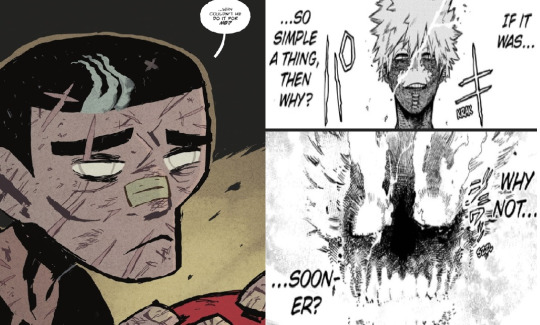
"You haven't been here long but you've seen him, right? The batman. The batman. He lives in darkness, to find the helpless and bring them into the light. So I have to wonder...why couldn't he do it for me?" The Boy Wonder: Issue #2
This is the story of the boy who didn't get saved. The story of a boy who really ought to have been saved. Of course, every victim deserves to be saved, but this boy was the son of a superhero. Can a hero who saves everyone, but fails to save his own son really be called a hero? As for the son, how does it feel to watch his father save complete strangers but let him fall to the wayside?
Jason Todd and Dabi are two characters with similar backstories and motives (so similar it's possible Dabi is outright based on Jason Todd) which are worthy of comparison. These are two tragic arcs which explore the conflict between a hero's responsibility to act as a father, and their responsibility to save people. As I said they are tragic because in both cases the hero fails, as a father, and a hero. However, I'm comparing the two because Jason Todd's story is a well written tragedy, and Toya's story is not.
If you were to write a story of my life, it would surely be a tragedy.
Aristotle's Poetics is the first attempt to define what Tragedy is, not as a story where sad things happen but a specific story structure. He outlines not only what makes tragedy, tragedy, but also what makes a good tragedy.
The Plot, then, is the first principle, and, as it were, the soul of a tragedy: Character holds the second place. A similar fact is seen in painting. The most beautiful colours, laid on confusedly, will not give as much pleasure as the chalk outline of a portrait. Thus Tragedy is the imitation of an action, and of the agents mainly with a view to the action.
I use this quote because the painting metaphor is a great way of explaining what I'm getting at, you can have a painting with the most wonderful colors, you can have a story with really good ideas like the Todoroki family plotline but if you don't use those colors correctly all you're going to end up with is a bad painting.
In poetics Aristotle clearly defines a tight well-structured plot as the first priority for effective tragedy, character as second.
Again, a beautiful object, whether it be a living organism or any whole composed of parts, must not only have an orderly arrangement of parts, but must also be of a certain magnitude; for beauty depends on magnitude and order. Hence a very small animal organism cannot be beautiful; for the view of it is confused, the object being seen in an almost imperceptible moment of time. Nor, again, can one of vast size be beautiful; for as the eye cannot take it all in at once, the unity and sense of the whole is lost for the spectator; as for instance if there were one a thousand miles long
To make sure you understand, it's vital in tragedy for all the pieces to fit together. Tragedy is a specific story format. Good tragedy uses the parts of a story well, but bad tragedy is sloppy and poorly put together. In tragedy, the whole has to be greater than the sum of its parts. The Todoroki Family are all good characters out of context, but the story could have enhanced their characters but detracted from them due to how poorly it is told. The fact that a lot of MHA fans are in love with the Todoroki family out of the context of the story, but also have constant complaints for how Horikoshi handles their plotlines is, in my opinion, very telling.
What Aristotle goes on to posit is the best tragedies do not come about by accident, but rather by the direct actions of the characters.
But again, Tragedy is an imitation not only of a complete action, but of events inspiring fear or pity. Such an effect is best produced when the events come on us by surprise; and the effect is heightened when, at the same time, they follow as cause and effect. The tragic wonder will thee be greater than if they happened of themselves or by accident; for even coincidences are most striking when they have an air of design.
Therefore Tragedies require consequentialism, like Newton's Third Law, every action will have an equal and opposite reaction. To simplify a good tragedy arises from the consequences of the character's actions (or inaction). The most basic form is that the hero of the story will have a tragic flaw that they fail to improve upon in time and then leads to their destruction. In essence, tragedy is where the hero fails. Not only does the hero fail, but the hero loses, and that irreversible loss is what defines tragedy. Medea slays her own children, Oedipus rips his own eyes off and deserts his kingdom, Creon Antigone is buried alive and Creon's son, her fiancee, commits suicide.
These events share two things in common, they are irreversible (hence why they feel like good endings), and two they evoke catharsis. Aristotle defines the goal of tragedy to evoke terror and pity. We feel alongside these heroes, Medea was abandoned by the husband Jason who she left her home and slaughtered her own brother for, Oedipus did all of his crimes unwittingly and is a victim of fate, Antigone was doing the right thing by burying her brother so his soul could pass on to the afterlife.
There's all different sorts of tragedies, Hamliet explores more here. I'd say UTRH and Hellish Todoroki Family are tragedies centered around grief.
Tragedy works on extreme emotions, and extreme hard-hitting consequences to the hero's failures. The worst thing a tragedy can be is boring.
The Tragic Hero
Now that I'm done lecturing you let's actually talk about both My Hero Academia and Batman like I promised. Both of these stories don't actually feature the central victim as their protagonist, and that is a feature not a flaw.
Rather, the story we are being told is that of a tragic hero, failing to save a tragic victim because of their own personal flaws.
These flaws are called (hamartia) or "error in judgement". A hero, being called a hero of a story is often unaware of his flaws which is central to what makes them unable to fix those flaws in time. That flaw can later lead to a moral failing, such as Othello's jealousy, initially jealousy is an understandable emotion, but then it leads to him trusting Iago over his own wife and killing his wife in a rage.
Most importantly, the hero’s suffering and its far-reaching reverberations are far out of proportion to his flaw.
Let's begin with talking of the heroes and their flaws, Batman and Endeavor. My main reason for comparing these two is in these specific stories they have the same flaw, inability to move past their personal guilt towards their son, and the same conflict the duty of a father versus the duty of a hero.
However, Batman functions as a tragic hero, and Enji does not. The summary of their conflict is right here in these two panels.
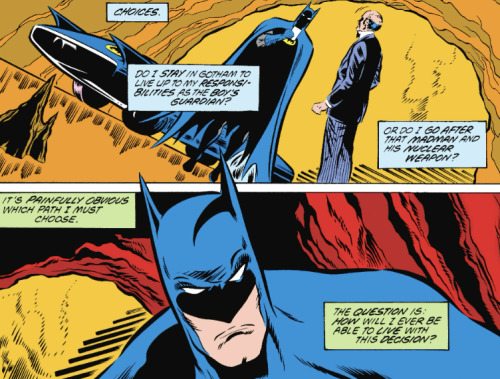
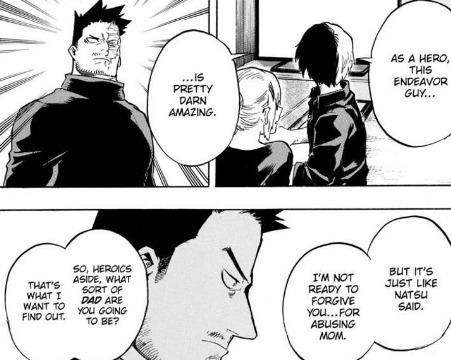
A parent is required to place their children above everything else, because they are the ones responsible for bringing that child into the world. Bruce Wayne made the decision to adopt Jason. Enji made the decision to have children, however with Enji you have the added insidious motivation of he only wanted to make designer babies and just didn't care for the ones who didn't turn out right.
Bruce attempts to do both, to act as a father for Jason and also a crime fighter as batman but he can't do both. This comes to a head in Death of the Family when Jason is having serious trouble because of his lack of a strong parental figure, and Bruce knowing that Jason is in trouble chooses still to go off and fight crime instead of staying with him. The choice to place crimefighting over the child they chose to take responsibility for has the unintended consequence of getting that child killed.
Whereas Enji makes the same choice over and over again, ignoring Toya's clear troubles at the fact his father no longer spends time with him and choosing to run away to the world of heroes because he doesn't want to face the fact that his actions are severely hurting his son. Bruce's motivations are more sympathetic admittedly he wasn't actively practicing eugenics, but the choice is the same and the consequences are the same.
Both Bruce and Enji are forced to bear witness to the deaths of their children when they are not there, specifically because they made a choice to be a hero instead of staying by their child's side. A situation directly caused by their choice to be a hero over a father, and a situation that would have been avoided if they had stayed with their child in their time of need. Jason runs off when Batman tells him to stay and gets kidnapped by the Joker, if Enji had been on Sekoto peak that day Toya would never have accidentally lost control of his fire.
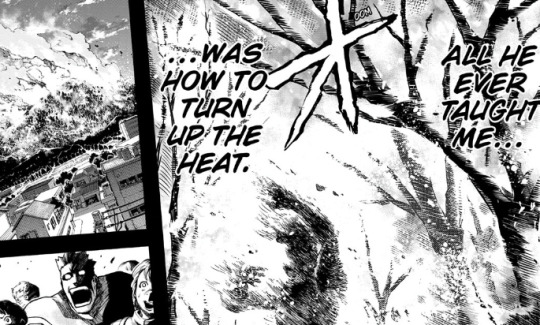
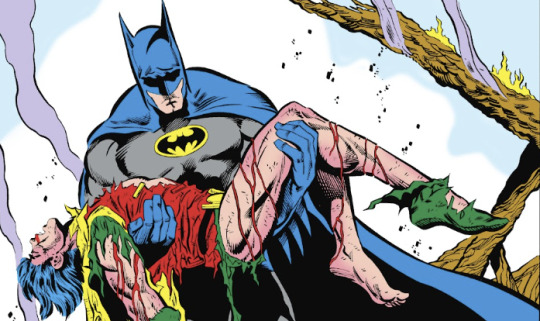
This is just the backstory however, the main event that kickstart this plot is the unexpected return from the dead of both Jason and Dabi. Each story follows the same plot beats. A new villain appears to challenge Endeavor / Batman. The villain reveals themselves as their dead son. Both Endeavor / Batman are given a chance to try reaching out to their sons, but they choose not to.
Then even though they are given a second chance with a miracle of a dead son coming back to them, they choose the exact same thing they chose before, being a hero and because of that the tragedy repeats itself. For both of them they are unable to save their son again, and the son goes through a second death. History repeats itself, the lesson isn't learned.
Their fatal flaw is their guilt. This is a story about grief and mourning after all, a son who is died, buried, but never grieved properly, never mourned, an open wound on the father suddenly coming back. The inability of each to process their grief blinds them from seeing the fact the son has come back, and they have a second chance.
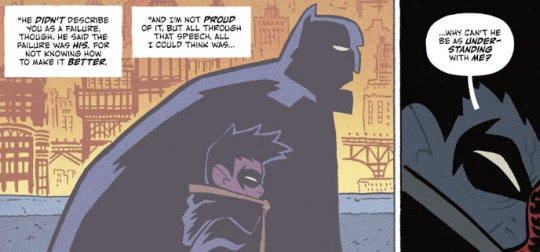
Toya has internalized he is a failure, because Enji literally called him that. Jason believes that Batman thinks he is a failure. In both cases the father is the one who failed, Bruce at least acknowledges this but cannot communicate it in any way shape or form.
This guilt and responsibility both Enji and Bruce feel causes them to self-sabotage. They no longer have the confidence they are in the right (they no longer feel like heroes because they have failed to be heroes to their own son).
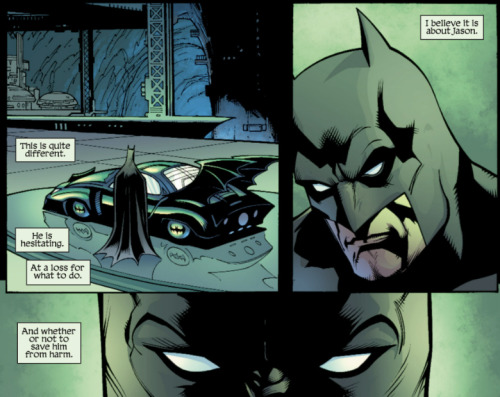
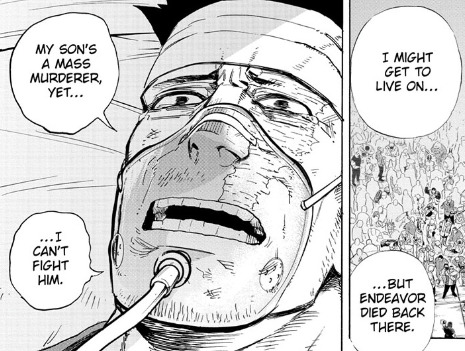
You can also add the layer of complication that since both men chose to be heroes in the past, they do not know how to handle the situation as a father now that they're being challenged to step up as one. Unfortunately, they are not the fathers that stepped up.
The reason their grief becomes a flaw is because they put their grief over their victims. . Each man is aware too much of their own failure, and while they should feel guilty they make the classic mistake of placing their own guilt over the feelings of the victim. The guilt they feel for causing the death and the genuine grief of losing a son is given priority over Jason and Dabi who you know... actually died.
An overwhelming grief and guilt is understandable because grief is a messy and human emotion, losing a child is an unimaginable tragedy that should never be inflicted on anyone.
Yet at the same time both Dabi and Jason are grieving to. This paradox that Batman only thinks of his own grief at losing a son and never stops to think about how Jason must feel leads to one of the best lines in Under the Red Hood.
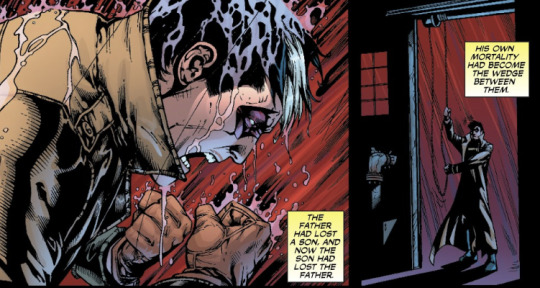
"The father had lost a son, and now the son had lost a father."
Batman's guilt is so strong over being the cause of Jason's suffering, that the suffering of the victim himself is ignored. To be fair to My Hero Academia, the Todorokis say a similar line to Enji.
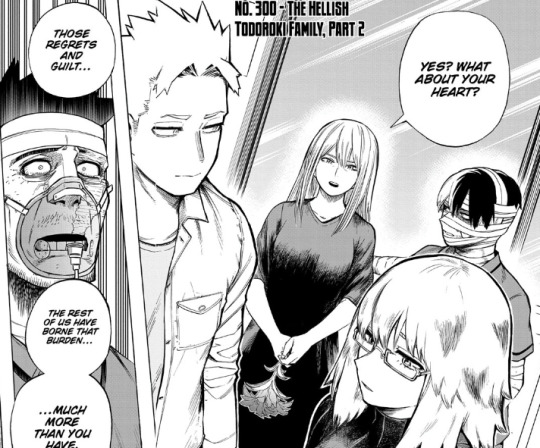
However, this is where I begin to get into the difference between ideas and execution. Tragedies are stories of actions and logical consequences, every action has an equal and opposite reaction in Under the Red Hood. Batman is punished for the choices he makes, the choices he doesn't make, and the choices he fails to make in time.
The Todoroki plotline features almost none of its character making any choices of substance, and because of that the plotline says the right things over and over again, but it all comes off as tell don't show.
I'm going to quote @codenamesazanka's post right here a couple of times because they describe the complete failure of the Todoroki plotline to show us a reason why we should be feeling things for the characters artfully.
We've heard Enji say this before - I'm sorry, I intend to atone. It's indeed the right thing to say, it's exactly what he should be saying and acting. Natsuo is declaring no contact - That's fine, I'm sorry, I accept this as part of my atonement and will continue. Touya calls him a coward - That's fine, I'm sorry, I accept this as part of my atonement and will continue. The public hates him - That's fine, I'm sorry, I accept this as part of my atonement and will continue. But you can only hear this so many times before you want to snap and beat the character, the story, the writing over the head with Enji's wheelchair. Why is that? He's behaving exactly as he should, and yet...
The reason why it fails to evoke strong feelings is because of what we'd called "narrative dissonance." The actions of Bruce and Enji are the same, they both neglect to do anything, make any real attempts to reach out to their victims because they're paralyzed by guilt.
However, we are told that they have entirely different arcs. Bruce's arc is a tragic fall. He's failing as a hero. While we are being told that Enji is experiencing an arc of atonement. Enji is supposed to be improving himself, and Bruce is supposed to be experiencing negative character development but they both do the exact same thing in story. Bruce neglects Jason, we are told by the story, by the characters in the story that Bruce is failing Jason. Enji does nothing in time to actually atone for Toya or try to help him, yet, we are told again, and again, and again, and again, and again, and again that Enji is atoning with nothing substantive to show us this is the case.
To show what I meant instead of telling this scene is in chapter 252.
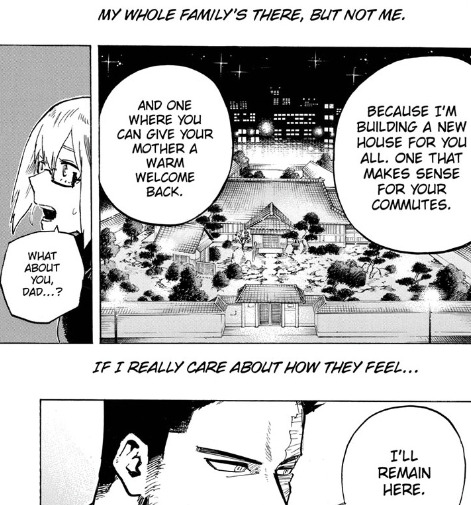
This scene is the ending point in chapter in chapter #426.
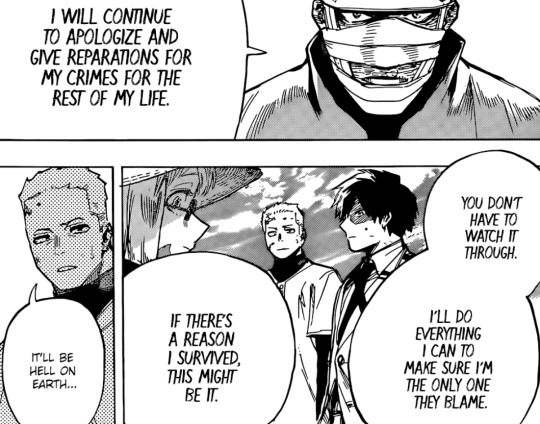
It's just him repeating the exact same sentiment and yet in a more than 150+ chapter gap, Enji never made any action to show he was now placing his family first. Enji didn't say anything to Dabi when he revealed himself as Toya. Enji didn't look for Toya in the months before the final war arc. Enji literally appeared on live TV in a broadcast that Toya was watching and said the very selfish "Watch Me" atone for the crime of creating Toya instead of literally talking about Toya or too Toya. Well, that would have rocked the boat too much... THAT IS LITERALLY THE POINT. Enji had to somehow break from tradition or make some significant sacrifice onscreen to his social standing to show that he's willing to put his family first. Enji decides to go along with Hawks decision to not face Toya head on, making the decision to be the hero for the final time which directly causes Toya to get up after Shoto brings him down non-lethally and make one last attempt to suicide bomb for his father's inaction.
Bruce does nothing for a long time in Under the Red Hood. He ignores his initial instinct that Jason came back and instead makes a long investigation on whether or not someone can come back from the dead in order to distract himself. When Jason takes the mask off, Batman already knew but was pretending otherwise because he didn't want to face the reality.
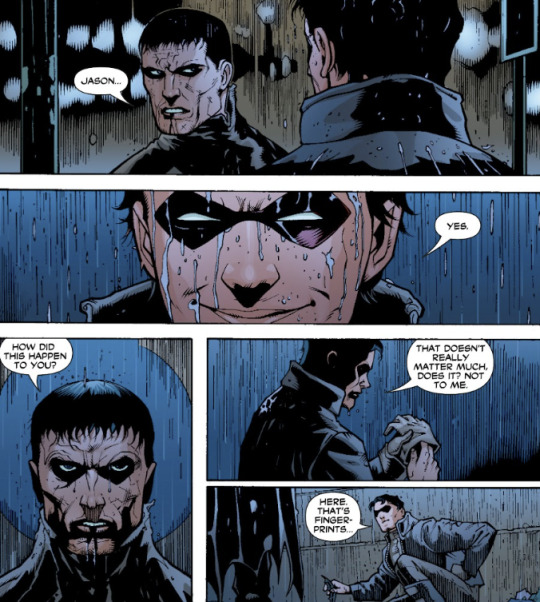
Even when Jason takes his mask off, Bruce still takes on the "I need to investigate this" angle even though Jason calls him out that deep down he already knows it's the truth. This of course foreshadows Bruce's underlying flaw, he doesn't want to face Jason head on because he feels too much grief about what happened to Jason and his guilt is more important than Jason's own grief. Just as the father has lost the son, the son has lost the father.
What follows is several chapters of Batman fighting crime as usual and making no attempts to directly search for Jason. They cross paths a few times but when they do Bruce doesn't follow. In fact, Bruce only shows up when Jason sends Bruce a sample of the joker's hair and Bruce knows that the Joker has kidnapped him out of Arkham. Bruce almost lets Jason get killed by Black Mask because he doesn't know whether to stop Jason or save him yet again, and then they have their final showdown where Jason has kidnapped the joker to demand Bruce kill him, and Bruce finally attempts to talk him down.
Out of context it sounds like I'm describing the same plotline, to the point where if you haven't read either, it looks like I'm complaining baselessly. Why is one hero doing nothing until it's too late good, and the other bad? The difference is of course context, or rather framing. Bruce's actions are called out by the people around him (Dick, Jason, Alfred) as him handling the situation wrong. Whereas both Enji's internal monologue and other characters say that he is doing his best to atone for his actions and deserves a chance, but the events we are shown in story are the exact opposite.
Here's another example to SHOW my point. Here's Dabi with my special, hardcover edition of under the Red Hood.
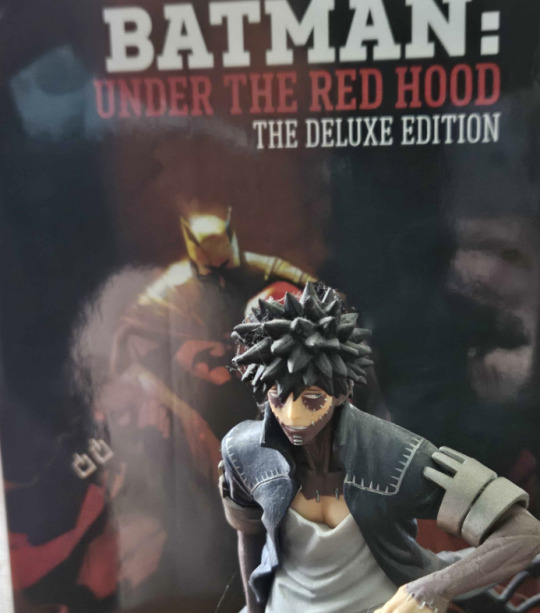
I reread the entirety of the fourteen chapter plotline and the majority of internal narrations come from characters outside of Bruce observing his behavior and commenting on how differently he's acting. Jason's backstory for instance is told by Alfred, not Bruce. Dick Grayson the first Robin comments on Batman's odd behavior. The rest are the third person narrator. Bruce has four instances of internal monologues spanning a few pages each in a 378 page story. (Alfred has the most internal monologues and he's presented as a more trustworthy unbiased narrator than Bruce, to get us to question Bruce's actions).
"Information travels on many routes, sometimes it comes predictably like the tides. You just need to know where to stand and meet it. Other times it's elusive and you have to root through the garbage to find it. In the last few years I've come to rely on Barbara Gordon, Oracle, we all did. Utilizing every form of surveillance equipment she has been the eyes and ear [...] but those days are over. I can't rely on anyone anymore. [...] and tonight it's also about the company I keep. It's different with him [night wing] out here. I think about when he was younger, when I was younger, it was different, simpler and I miss it. I miss those days, for that it's hard to be around him.
This first internal monologue is a case of unreliable narrator, because as soon as finishing it Dick Grayson / Nightwing shows up, offers Batman his help and while Bruce at first refuses it the two of them are forced to work together to fight Amazo. What does this show us? Bruce is not alone, but Bruce actively acts like he's alone ignoring the feelings of the other people around him. It exhibits a flaw of Bruce and the bad headspace he is in mentally (if I remember correctly Stephanie Brown recently died in the comics while this storyline was being published. It establishes Bruce's improper coping mechanism with grief, and how he is going about it the incorrect way.
Bruce says I work alone, and then Bruce says it's easier working with Dick, I miss it, but I can't go back to those days. It's bruce's contradictory thinking patterns in the same chapter that stop him. it's bruce's fault he cannot connect to Dick, and he is actively mourning the past because his relationship with Dick has changed.
Now the final part of the monologue in that chapter.
He's quick. Not just fast, agile. He's not thinking about his next move, he's just making it. He's been trained well. And there's something about him. Something familiar. There was something interesting about before he cut the line, before it had been taught. That had to have been practiced. Either that or just plain dumb luck. No it's not luck.
This is the first hint that Bruce already suspects it's Jason from early on but is in denial about it. This unreliable narrator trope also gives an agency to Bruce's decision, he is actively choosing to ignore the possibility that it's Jason because it doesn't want it to be.
Whereas, a lot of Endeavor's plot takes away any agency from him. For example, he doesn't even know that Dabi is Toya, because if he had the sneaking suspicion and ignored it like Batman did that might have made him look bad. We can't have the main character in a tragedy looking bad now can we?
The second monologue is more denial.
That device is from Kord industries. I should know. Ordered it special from them. How can he have it? No more dead ends. No more questions. No more guessing. Tonight I find out what is passing for the truth.
Reading between the lines this is outright confirmation Batman already knows.
The third is a brief reflection in his feelings for Jason.
The armor has to be light enough to fit but strong enough to protect. But sometimes a great many times, it's not strong enough. It wans't strong enough for Barbara who has to fight from her chair. It wasn't strong enough for Stephanie, other dear soldier enough dear grave. And it wasn't enough for Jason. Willful Jason. Who ignored the danger. Who spat at risk. Who was never frightened enough. I've always wondered... always... was he scared at the end? Was he praying I'd come save him? And in those last moments when he knew that I wouldn't. Did he hate me for it?
This monologue directly shows without stating it outright, Bruce is prioritizing his feelings of grief and failure mixing them in with his genuine grief over the loss of a son. it's selfish of him, but grief is a selfish emotion.
Here's the thing Bruce is allowed to be selfish and to not have the correct reaction to his grief, because the whole story is centered on Bruce being unable to get his shit together in time, and this picture into his emotions is an explanation as to why. Bruce is afraid of being hated by Jason. Jason of course has every right to hate him for failing as a father, but still I think not wanting to be hated to a person you loved so much and feel genuinely sorry over what you let happen to them is an understandable reaction.
Meanwhile we have Enji saying repeatedly all the right things in his monologue, the selfless, I don't need to be forgiven, it's okay if they hate me, I just need to atone but he never actually does anything. There's no explanation for why he isn't doing anything either, so that narrative dissonance. We're shown why Bruce doesn't act in time, he's internally a mess to be frank. We are not shown why Enji doesn't act in time because his internal monologue tells us again and again he's committed to atoning and he understands what the right thing to do is.
As Codenamesanzanka says:
Enji is still saying all the right things, but the story isn't giving him the opportunity to actually do the right things. To have his new actions matter. I have no doubt about his sincerity in his mantra, but without the 'show', it's hollow. Similarly, "Let's talk" is actually kinda bullshit too, because it's so vague. This is less about Enji, and more about the writing, how it set up this scene. "Let's talk" or "I want to talk" or any of that variation is repeated 6 times, without anything more or specific added.
There's an excess of repetition of Enji saying he wants to atone, he's ready to atone, without any of that materializing in the story.
As @class1akids says in this reaction post:
It also feels also super-hollow to say he's sheltering the family from the fallout, after they've just talked about how Fuyumi lost her job (and got a new one through the connections she herself built). How is he going to do that?
The fourth because I don't want to write it down, it's just Batman monologueing on how his partnership with Jason is still good and explaining the technical details of his fight with count Vertigo. It's in chapter 10 if you must look it up.
So four monologues total. Two monologues establish indirectly that Batman knows that Red Hood is Jason and doesn't want to face him. The third monologue establishes why he doesn't want to face him, he's afraid of being hated. The monologue is in line with Bruce's actions in the story, Bruce investigates several ways of reviving from the dead instead of looking for Jason.
The character's reactions around Bruce are also talking about how he's not acting like himself. Especially Alfred's who speaks of Bruce's indecision, on whether to put a stop to or save Jason.
"It is curious. He is lost in thought. It is not like him to spend vast stretches of time immobile, where his mind is gripped in the solitary process of deduction. This is quite different. He is hesitating. At a loss for what to do. I believe it is about Jason. And whether or not to stop him or save him."
This is illustrated in two scenes later where Jason spends a long time simply watching when Jason is fighting enemies, first in a fight against Captain Nazi, and second Black Mask. Jason even gives a direct callout of that behavior.
Jason: What the hell took you so long? Couldn't decide if you wanted to let me live. Batman: Shut up and fight.
Observed by Alfred Bruce is completely stalling and can't choose, observed by Jason Bruce can't decide whether to let Jason live or not. Bruce hesitates twice. We know why. We see it in action. It's called out as flawed behavior.
Now let's cover all the tell that don't show that is Endeavor's many monologues.
Pro Hero Arc:
I have to safeguard the future for them. That's the job for whoever's on top. What about the lives I cut short? Just demanding forgiveness isn't enough, it's too late for that. At this point I need to atone there's no other route.
Hellish Todoroki Family 1:
I'm trying to make ammends going forward. It might be too late. but I fall asleep every night thinking about it. Lately it's been the same dream. The wife and the kids looking happy at the dinner table. But I'm never there with them. It might be too late but I fall asleep every night thinking about what I can do for my family. I wish you could be here too, Toya. It's always the same dream. My whole family's there but not me. If I really care how they feel [I'll remain here].
I'm not going to read 200 chapters so I'm just going to ballpark it based on memory. Here we go.
Dabi's Dance:
My eldest, Toya didn't harbor frost within him. He didn't have a way to overcome the inescapable downside of overheating but I nevertheless sought to raise the boy as a hero. [...] Because Toya had more potential than me I placed my ambitions on his shoulders. I thought it could be you. You could have been the one to reach my eternal goal. My frustration... My envy... The ugliness in my heart... you could have been the one to smash it all to dust.
Plot twist this is the only monologue I like. It's different from all the others, and it's the only one where Enji is being emotionally honest. He put the emotional burden of his own emotional insecurities on an eight year old child, and expected to live vicariously through him and when Toya failed to live up to those expectations he just abandoned him. It alligns what we have been shown so far, Enji is not acting like a reptentant man here who realizes the harm he's done to Toya and only thinks of Toya as an extension of himself and his own regrets.
The Fight Against AFO:
My mistakes took the form as Toya leading to many stolen futures. The past never dies. Rage, resentment and even penace wound together toward the future. And the future is a path for the young. A path with so many branching choices. That's why I must win this. [I'll keep paying my penance. I'll win today and keep my eyes on Toya.]
When Enji decides to double Suicide with Toya:
I take full responsibility. I swore to bear the burden and live my life atoning for it all. However, you've been watching me all this time. While I couldn't be there to watch you. You were someone I especially needed to do right by. No I can't let you meet your end alone, but I won't let anyone else get caught up in our tragedy.
Hellish Todoroki Family Final:
I came to talk about what's to come. I'm retiring as a hero. That was my initial plan even before the war started, but now I can't even walk on my own. The hero endeavor burned to death. Your flames were really stronger than mine. [...] You're right. You know everything about me, Toya. After all you were always watching me. And you wanted me to do the same for you, but I didn't. Not matter what anyone says your heat does come from my hellflame. From now on I'll come everyday, so let's talk. It's too late now, so let's talk. [...] You're free to hate me. Anything is fine really, so throw it all at me.
This one is spoken dialogue but it's still a four-page long monologue. Every one of Enji's monologues with one exceptionsays the same thing: I'm sorry, I'll spend the rest of my life atoning for my actions.
We're repeatedly told Enji is atoning but he acts like Batman. Then, his actions should be framed as Batman, not atoning but avoiding any responsibility.
As observed by Class1akids when we were discussing the update:
Everyone else faces an uphill struggle with their lives, but we should all feel sorry for Enji atoning and being in hell. I hate Hori's compulsion to over-write his abusers and over-explain their atonement. He does this with Bakugou too but with Enji it's more irritating. It was so much more enjoyable when he just wrote the thing but didn't point at them and say -> look, they are atoning. Aren't they soooo cool??
Enji's internal monologues and the other characters frame him as some sort of martyr, while on the other hand it's clear by both Batman's actions and Alfred's observations he's not acting like his usual self. In fact, this is an interpretation of Under the Red Hood that I love from the writers of the video game Arkham Knight that does a less tragic retelling of Under the Red Hood:
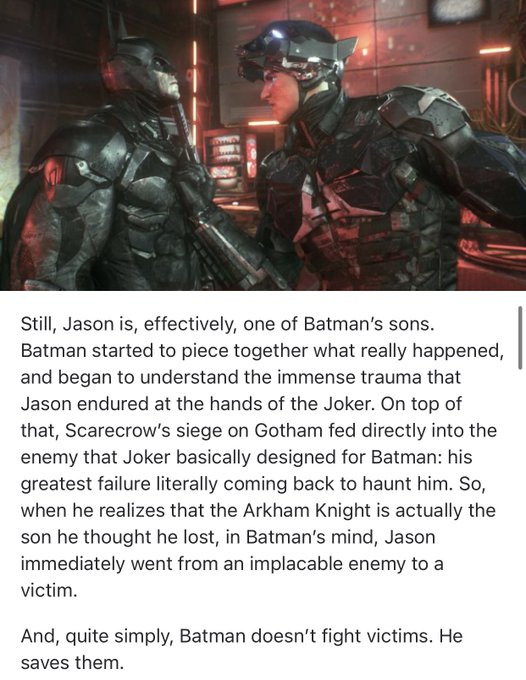
Batman doesn't fight victims. He saves them.
Therefore if Batman is fighting Jason, a victim, he's not acting like Batman. I'm also fine with Arkham Knight being an Under the Red Hood retelling because it's a different story. Comics do this all the time, different universe versions, popular storylines adapted into different mediums. It also works as a commentary on the original story, by showing what Batman could have done to lead to a more positive outcome it makes Batman's choices in Under the Red Hood worse and more tragic because he could have saved Jason, there was still a chance.
So here we have two flawed tragic heroes who are meant to be both pitied and condemned for their actions. One of them is all pity with no condemnation. The other is both pity and condemnation, Batman is grieving, but also he's failing his responsibility towards Jason. Therefore one protagonist works, the other fails utterly.
I'm not saying abusers don't deserve redemption. I'm not saying Enji should have died in order to atone. I'm not saying that the underlying problem with the arc is that they decided to make Enji sympathetic and a focus of the arc. The most important problem is the breaking of one of the fundamental rules of storytelling: Show, Don't Tell.
The Tragic Villain
Not only does The Hellish Todoroki Family plotline fail to make Enji a compelling protagonist, it also fails it's biggest victim. Now, these are both stories that end with the hero failing to save their victim. So if both of these stories have the same ending, why am I saying it failed Dabi, but not Jason?
Well, let me explain.
Dabi and Jason are both villains turned victims. The stories themselves are about this ambiguity. How much should the be held responsible for their own choices? If they are actively harming innocent people, then shouldn't they be stopped? Should they be automatically be forgiven just because of the pain and grief they've suffered, even if they've been causing it to others?
Both characters are also reflective of their fathers because they are too being selfish in their grief, they want their grief acknowledged and so are violently lashing out.
Jason and Dabi both make plays at being vigilantes at first, Dabi wants to inherit Stains will, and Jason Todd wants to be a better bat-man by taking control of the drug trade in Gotham and cutting crime down by executing gang heads. However, neither of them are being honest with this and it's shown through their actions, both of them abandon their original plans.
In the final showdown all Toya cares about is facing Enji on the battlefield, and when he's on the brink of death his mind erodes to the point where all he can do is scream for Enji's attention while his flames get hotter and hotter.
Let's take about Jason first and how his narrative treats him a whole lot better and more sympathetically, with more humanity than Batman. Jason is still held responsible for his choices, he is criticized by Bruce for murdering gang leaders and passing it off as justice. He's also blatantly shown to be a hypocrite. My favorite scene from Red Hood: Lost Days, the official UTRH prequel.
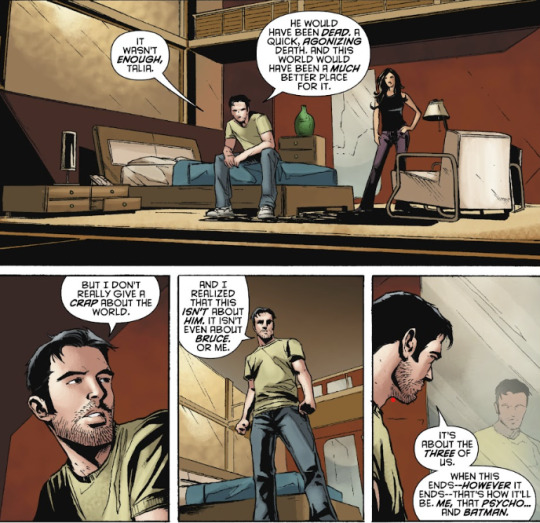
"I want to kill the joker in a cool way. Just sniping the Joker from a rooftop isn't dramatic enough for me."
This scene, and the final scene of UTRH underlines Jason isn't executing criminals because he believes it's the right thing to do, or because of his stated motivation that killing the joker would prevent more future victims.
Instead his every action is to set up a scenario where he makes a selfish demand of Bruce. He wants Bruce to prove to him that he would choose him over being a hero, by setting up his final scenario. Him, the Joker, and Batman. Jason will shoot the Joker. Bruce has a gun. He can either choose to let Jason kill the Joker, or kill Jason to stop him, either way it makes it clear what Bruce's priorities are.
The underlying reason for this is similiar to Bruce. Just like Bruce, Jason is deeply afraid that Batman doesn't love him. That he thinks of him as a failure. (This is Toya's main reason too).
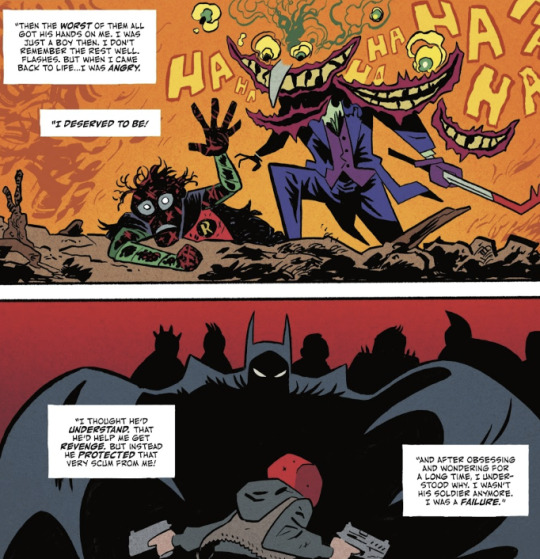
He also interprets Bruce's failure to avenge him to mean that Bruce didn't even care enough to mourn him. If Bruce loved him enough, he'd choose him over the joker, but he's so afraid that Bruce doesn't love him enough that he's going to force Bruce to choose.
Along the way he's also going to behead several crimelords in order to put an exclamation point on that point.
The way Jason completely unravels in the confrontation shows this insecurity, he begins with monologueing about how batman should totally kill people, until his fear that he wasn't important enough, and his grief at losing his father is revealed.
Batman: I know I failed you, but I tried to save you. I'm trying to save you now. Jason: Is that what what you think this is about? Your letting me die. I don't know what clouds your judgement worse, your guilt or your antiquated sense of morality. Bruce, I forgive you for not saving me. Jason: But why on god's green earth is he still alive? Ignoring what he's done in the past. Blindly, stupidly disregarding the whole graveyards he's filled with people. The friend's he's killed. I thought killing me - that I'd be the last person you ever let him hurt. Jason: If it had been you that he beat to a bloody mess. If it had been you he left in agony. If he had taken you from this world. I would have done nothing but search the planet for this pathetic pile of evil, this death worshipping garbage, and sent him off to hell.
Direct statement, it's irresponsible of Bruce to let Joker live after killing Jason and should have put him down to prevent future victims. Reading between the lines, Batman not taking revenge for Jason is a sign that he didn't love him enough, Jason loves Batman more because he would have taken revenge.
As the confrontation continues and Jason's mental spiral worsens, to the point where he can't keep up his pretense of self-righteousness.
Jason: I'm not talking about killing cobblepot, or scarecrow, or riddled, or dent. Jason: I'm talking about him. Just him. And doing it because...he took me away from you.
The father had lost the son, and now the son had lost the father.
Jason's revenge is just a cover, for his grief at losing Bruce. I think this also shows a really positive aspect of Jason's character to humanize him instead of condemning him for his actions to ignore or even justify the suffering he endured: Jason really loves Bruce.
I mean how meaningful is the statement: "Bruce, I forgive you for not saving me."
Bruce has been afraid to hear the whole time that Jason hates him, that he won't forgive him, but Jason loves him deeply. In fact his love is almost equal to his rage because Jason is a deeply emotional person, and these little details make him human and not just like a plot obstacle that Bruce has to face. A metaphor for his past failures.
Dabi is drawn as a crying boy who wants comfort, Jason is shown to be a crying boy who wants comfort through both dialogue and action without us directly needing to be told. It's a heartbreaking line and doing it because he took me away from you and it lands perfectly because the narrative wants us to just look at Jason's grief. It doesn't add an asterisk* even though he was in pain, he's done unforgivable things that can't be justified to undercut Jason's suffering.
In fact that might be another underlying problem with The Hellish Todoroki Family, the narrative tries too hard to make you feel a certain way instead of just presenting things as they are to make you come to your own conclusion. UTRH doesn't support Jason's revenge based serial killing of villains. It doesn't say he's justified to cut off the heads of mobsters. However, it doesn't excessively state "Well, I'm really sorry what happened to you but what you've done can't be forgiven" so we don't have to challenge ourselves to feel too much empathy for Jason's suffering.
Meanwhile even when Toya tries to express his rightful anger and grief, we're always met with someone shutting him down and saying well yeah, but you're wrong, involving innocent people is unforgivable.
As said by @stillness-in-green in the replies to this post:
I think so much harm (in-universe, but the state of the Twitter fandom makes me think the messages are pretty toxic irl, too) comes out of portraying the Heroes as needing to weigh in on the *morality* of the Villains' actions before they gauge "saving" them, when that is not a thing that glorified cops have any business thinking they have the right to do. Demanding repentance before the rehab is so bizarre.
You can say someone's actions are wrong without using it as a factor to consider whether or not their suffering as a human being should be acknowledged, and like I said there's multiple instances of people just yelling at Toya how immoral he is instead of addressing the elephant in the room.
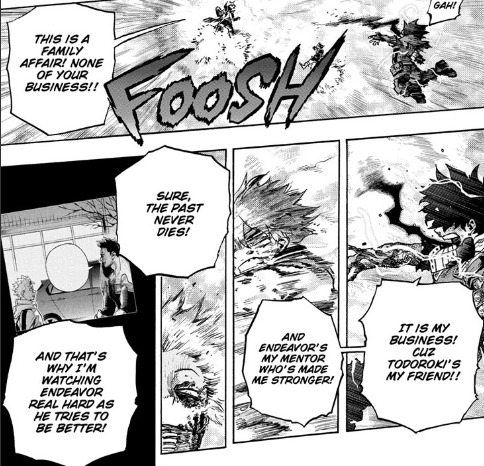
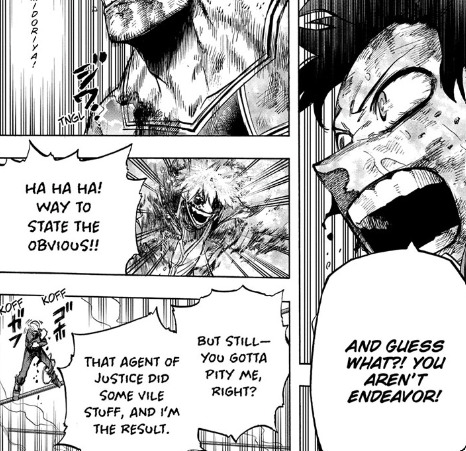
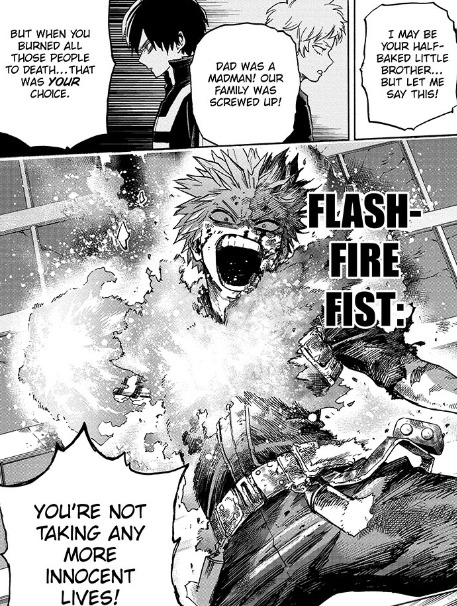
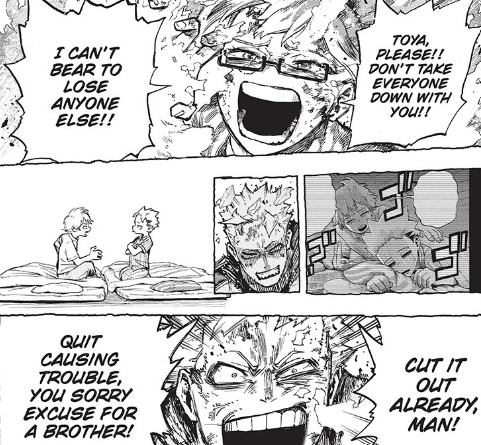
You're wrong, you're wrong, you're wrong, you're wrong.
(Okay, I understand that some people have interpreted this as a show of Honnae and Tatamae, the Todoroki's who are a very repressed household are finally talking about their feelings even if those feelings are selfish and ugly).
(I'm not criticizing Shoto for saying that the people he killed were his own choice necessarily, Shoto is a character who's actions need to be read more deeply than his words he was dedicated to bringing Dabi down without him burning himself any further start to finished. My criticism lies in the fact that Hori uses Shoto as a mouth piece because he thinks we need to be reminded that murder is bad).
However, even acknowledging that time and place man, time and place. They couldn't have done that in the aftermath, when Toya isn't burning to death?
Hey buddy, you're being selfish.
Toya: AHHHHHHHHHHHHHHH I'M MELTING, I'M MELTING.
This is I feel the underlying problem with the way the arc is written, not because the Todorokis are a very traditional Japanese family and there are cultural reasons they express their emotions differently, I'll give a caveat to that it's a nuance I might not understand.
However, I am arguing the actual problem is tell don't show. Horikoshi thinks that we as an audience need to be told multiple times that murder is bad, and we cannot be trusted to interpret that on our own.
Under the Red Hood shows both sides of Batman and Jason's debate, and let's us just come to the conclusion that Jason is in the wrong because revenge isn't justice. Horikoshi reaches no shit sherlock levels of telling us that we're not supposed to approve of Dabi's murders.
it's also a matter of giving Dabi narrative space to express his feelings, like every time Dabi tries to talk he is continually shut down (Shoto does engage Dabi talk to him and listen to why he didn't come back though I'll give him that) and it seems to be to push forward this weird idea that you shouldn't sympathize with the pain Dabi has endured or the ways he's dehumanized unless he does something to prove he deserves to be treated like a human being first.
Jason gets to monologue and make an entire argument, and his argument also shows the depths of his love for Bruce and what a deeply feeling person he is, and how those feelings being hurt and twisted could logically lead to his lashing out.
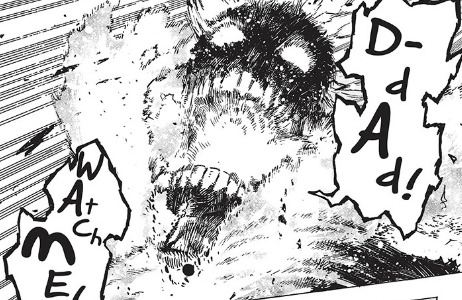
Compare this to Dabi who doesn't get a final monologue, but is instead reduced to a completely mindless state where he just cries out for his dad's attention. He doesn't get to make his argument.
Jason and Dabi both choose to blow themselves up, but Jason gets enough character agency to show this is a deliberate choice he's making even if it's the wrong one. He retains his character agency and ability to make decisions until the end of the narrative.

Jason's also you know physically crying. The end result of the narrative is about wrong choices that both Bruce and Jason make together, and then suffer the consequences together. Bruce watches the same failure play out again and he isn't able to save Jason, Jason doesn't get what he wants, he doesn't get revenge and he doesn't get to reunite with his father. It's tragic for both of them, and brought about by decisions both of them made.
Whereas yes Dabi makes a lot of bad decisions leading up to the last war arc, but in the end his final fate is up to a choice Enji made to not face Toya in the final battle.
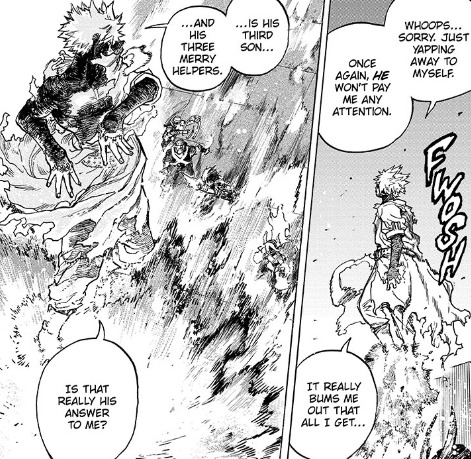
However, while the final consequence of the battle is brought about more by Enji's decisions than Toya's, it's Toya who endures all the suffering and punishment. It's Toya who is in an iron coffin, and doomed to slowly and agonizingly die with all of his skin burnt off unable to move. Toya doesn't even get agency after the arc is over. Enji still has a wheelchair, Enji can still move around, Enji's still fucking rich, he's not in prison for his actions, he as Rei wheeling him around.
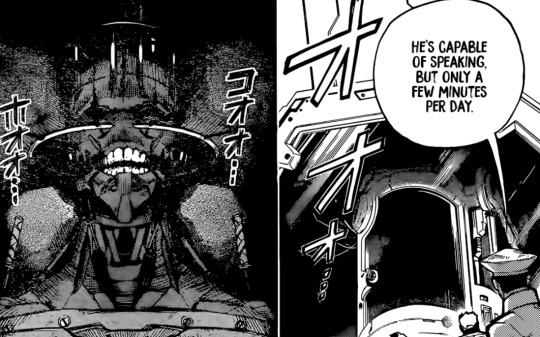
Toya's agency and choices are all taken from him, presumably to serve the plot purpose of making Enji save him to finish off his arc, and then ENJI DOESN'T EVEN SAVE HIM.
Also I think it's important to mention, Bruce's tragic ending is brought about by him attempting to save both, trying to save the joker and Jason with the same action. Whereas Enji's tragic ending is brought about by Enji NOT LIFTING A FUCKING FINGER TO HELP. Yet, it's Dabi who has the lion's share of suffering, and is sentenced to this horrific state of being skinless in an iron coffin and only being able to be awake a few minutes a day with no choice but to waste away.
Bruce is also immediately called out for his actions, by the Joker of all people, you handled this all wrong, it's your fault. Bruce is right to not kill the joker, killing the Joker would not have solved any of Jason's problems, but the fact that he put off facing Jason for so long, and his inability to communicate that he loves Jason is what leads to Jason thinking that the only way to prove Bruce loves him is to force him to choose. It's because Bruce has utterly failed to show him in any other way that he is loved.
Joker: Oh my god, I love it! You manage to find a way to win, and everyone still loses. I'm going to be the one who gets what he wants tonight, badda bing, badda boom."
I'd also like to add that a lot of agency in Enji's actions are taken away too, to make him look more blameless. It's not Enji's fault that he didn't say anything to Dabi during Dabi's dance, he passed out because he had a punctured lung. It's not Enji's fault that he spent a month protecting Deku instead of searching for Toya, he had to protect innocent people. It's not Enji's fault that he didn't go immediately to face Toya in the final war arc Hawks told him not to.
It's not Enji's fault that he made Shoto and Toya fight like Pokemon instead of cleaning up his own mess, and also he feels really sorry for it and as soon as he's done punching the bad guy he'll look after Toya he promises.
Enji does get called out for this behavior but it falls flat because it only comes from the villain AFO, and Toya himself. As I stated above too, the ending is more influenced by Enji's actions not Toya's (because Toya's agency is stripped away until he's mindless) but Toya is the one who has to die while Enji gets to live and atone.
That is the real sticking point for The Hellish Todoroki Family, the way it ends.
Themes Are For Eight Graders
The underlying problem with the whole arc and why The Hellish Todoroki Family fails as a tragedy, is because it wasn't written to be a tragedy.
The above quote is from an interview with the writers of the widely hated Game of Thrones Season 8, which took a sudden tragic turn for Dany's character, gave her an incredibly dehumanizing ending of being put down like a rabid dog by her own lover, an ending that was neither foreshadowed nor did it match with anything written before.
In this meta here by @hamliet it goes far more into depth that Game of Thrones isn't a tragedy, but a piece of Romantic fiction (not a love story, Romanticism is a genre of big emotions, the beauty of life, larger than life ideas hence why it fits well with fantasy genre, it can be sad but it doesn't follow tragic structure).
Dany is a romantic heroine, a deconstruction of the idea of the classic warrior princess trope, and you know a colonizer, but she's not meant to be written as an inherently bad person. There are people who say that Dany was going to die in the original books. I'm one of those people. Me. However, context and framing matters, Dany for all her colonizing ways does genuinely want to do the right thing, so it's likely she'd die a heroic death as a reflection of her selfless intentions (and intentions do matter for fictional characters) whereas in the show she's put down as a villain.
Now watch me I'm going to coin a term for future literary critics to use: Narrative Gaslighting.
Narrative gaslighting is different then Show Don't Tell, where an author has just failed to properly show what they're trying to tell you in the story. Narrative Gaslighting is when a narrative deliberately tries to mislead you, straight up lies to you, or just insists things that did not happen totally happened guys. Much like real gaslighting, Narrative Gaslighting makes you feel stupid for interpreting things a certain way and insists you were wrong all along.
Narrative gaslighting is when Tyrian gives a speech that everyone should have suspected Dany when she burned slavers alive that she was secretly evil and would one day turn on them.
Like, no.
Dany is flawed because she is a foreigner, interfering with the politics of a different country that she does not understand in order to gain enough resources and men to return to her home country and invade that country to exercise her right as a Targeryn to uphold the divine right of kings.
Game of Thrones doesn't mention any of that shit that's in alignment with the previous actions in the story, it's just insisting the very ableist notion that Dany was insane all along and her violence towards other people is the result of her mental illness.
(Also before anyone says, so if she's a colonizer than how can she have good intentions, everyone is Bad in Game of Thrones, they're all waging war to vie for a throne, monarchy is bad guys. IDK how to tell you that Game of Thrones has gray on gray on gray on gray morality).
(Also this aside ties into the hangup of MHA and most popular fandom culture on Twitter, that Dany's moral failings somehow disqualify her from her humanity. In spite of the fact that on top of all of that she's a rape victim, and like, Dany's only on that continent in the first place because she was sold as a bride.)
But here's the same weird subtext that Horikoshi's writing of Dabi. The fact that Dabi was continually victimized and denied human dignity does not need to be addressed, because he did the bad things and didn't atone properly enough for it first.
In essence this random post on the gunnerkrigg court forums I found on the same day the chapter came out, displaying apollo's gift of prophecy.
"When someone is persecuted, it's important to inform everyone about their flaws. That way you don't have to feel anything about all the times that they were denied human dignity."
So, Dany is not written as a tragic hero but a romantic one, we as an audience are both meant to acknowledge her flaws and sympathize with her, not demonize her in an ableist way for being insane, and even if Dany is meant to die the tragic way she dies does not match up with all of the narrative foreshadowing that was built before that.
Like, for instance a lot of POC after the show ended kept telling everyone that Dany's actions in a foreign country were seriously problematic, and not only did the audience not listen but the showwiters didn't acknowledge it with the same subtlety as the books. So those people especially were able to pick up Dany's character flaws, and when the show finally acknowledged them it's not even in the way that critiques of the show were pointing out Dany's flaws it was just "she was insane all along." Not like taking time to go "no matter what the intention, interfering with the politics of a foreign country is wrong."
The problem with the Todoroki arc is essentially the same, down to the ableism (because outsiders continually call Dabi either a maniac or insane Demon without even giving credence to his grievances about hero society he's just reduced to an insane fringe element of society, and Dabi himself is reduced to a completely mindless, childish, insane screaming state where he can't make active decisions).
The Todoroki Arc is not set up to us as a tragic one. The ending is pretty clearly telegraphed to the whole audience. People are not wrong for thinking that Toya's ending would be either rehabilitation like Rei with the eventual hope of being welcomed home, or some kind of house arrest where he still gets to be with his family.
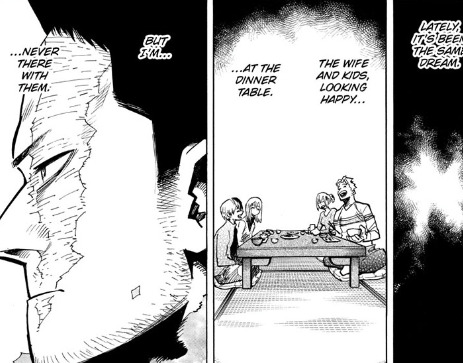
Everyone happy at the Dinner table and Enji not sitting with them.
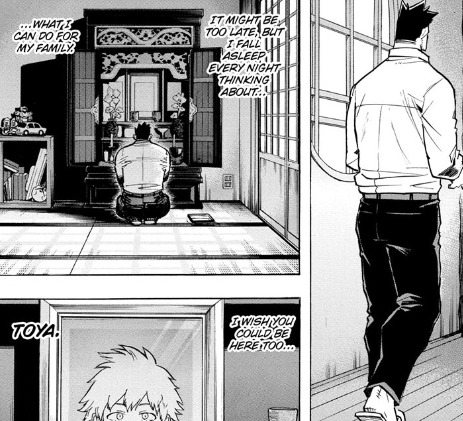
"I wish you could be here, Toya."
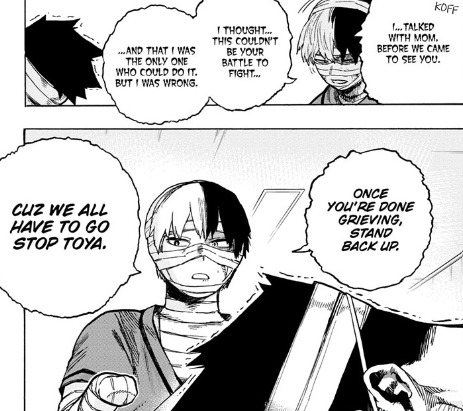
"We all have to go stop, Toya."
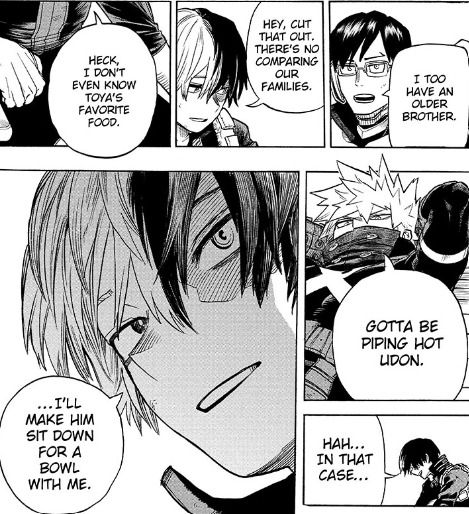
"In that case, I'll make him sit down for a bowl with me."
Even Shoto's efforts to take down Toya non-lethally are rendered completely pointless, because Toya gets back up again and then burns himself alive (completely by his own choice so no one has to feel bad that they failed).
The story sets up the expectation that Toya is going to be brought home and sit down for a meal with his family. Then it makes you feel stupid for going in an entirely different direction. It was always going to end this way didn't you know The Todorokis are a tragedy?
Well, I just spent a very long section of this thesis statement illustrating that if it's supposed to be a tragedy, then it's still not written well.
It's a written as a romantic story of a family healing, and the villain getting saved, only for the villain not to be saved and the story to just keep on going like not getting saved isn't a huge failure. This is something that should permanently destroy the main characters, that they got the chance to repeat Sekoto peak and be there this time and they all utterly failed. I feel bad for Shoto most of all because he did everything right, and he still loses his brother, but does the story show that?
The problem is the story is blatantly lying to you about the fact that Toya was somehow saved, even though he LITERALLY LOOKS LIKE HELLRAISER. To quote Codenamesanzanka again:
But I feel the story couldn't give us that because it will remind the reader and everyone just how much Touya will be missing. In-story, talking any more will overburden Touya's heart - and how apt is that metaphor? So let's talk about how we'll talk, but that's all that's allowed here for this scene. Else we'll see how unfair it is that Touya has to be confined to this room, he isn't with his family and they have to come to this prison just to tell him about their day, and soon he will be gone. Details make it real, and it would've exposed the lie that Touya was saved in an actual way. The story knows it too - "this extra time Shouto gave us." This is all 'extra', and not the core. [...] If the story was sincere that this is a case of "it's simply too late" - as it should be!!! imo, to really drive in the clear point that they failed, they did not get the save they wanted, because that's the truth - the tone of the chapter isn't tragic enough for that. The tone is going for 'Making Peace With This'. We've skipped the stages of grief and all we have is acceptance. The characters have accepted this, and so must the readers as well.
Therefore it's narrative gaslighting, the story is making us doubt our perceptions and trying instead to manipulate us to feel a certain way. We don't have to question the unfairness of Toya's fate, because look at all the people he's hurt, and look how Enji is atoning and taking responsibility.
The story builds up the idea that Enji will choose Toya. That he will choose being a father over being a hero. Enji doesn't do that, and it's Toya who suffers the horrific, painful consequences while Enji gets off mostly scott free. Mind you it's also ableist to suggest that being in a wheelchair is some sort of life-ending consequence like he's fine. The story even goes out of its way to say how avoidable this ending could have been if Enji or Rei or someone lifted a single finger to give Toya the acknowledgement he wanted, and then gives it a "Too little, Too Late" conclusion but doesn't acknowledge that this is where it's ending and instead tells us that Enji has successfully atoned.
"Everyone's watching me. So this is what it's like. If it was such a simple thing, then why not sooner?"
If it was going to turn out this way Toya should have just died here, not because death would somehow be a mercy compared to life in prison, but because the Todoroki Family doesn't deserve to get to pat themselves on the back. If they let Sekoto Peak happen a second time, then they should have to deal with the consequences of that.
It would be consistent is my point. This is written as a "Too Little, Too Late" kind of ending, but we don't get the emotional response from the Todorokis that they've let Toya die a second time.
On the other hand, UTRH has the exact same tragic ending but it doesn't make me angry because it's honest about it. The Todorokis let Sekoto peak happen a second time. Batman let Death in the Family happen a second time, but look at how even the narration and comic panels of the story acknowledge it.
"Fate is a funny thing. It swells up like a raging current and we are forced to travel. It provides us no exit. No deviation. It drops us in a bottomless ocean and compels us. We either swim, or drown, and sometimes as we struggle against the tide, a great truth arises."
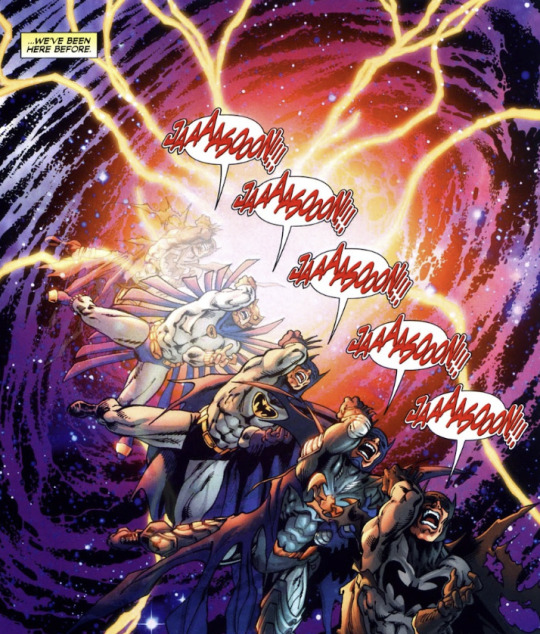
One ends with Enji meaninglessly stating that he'll spend the rest of his life atoning for Toya and watching over him (which I guess will be like two months tops) for the fifth time. The other ends with Batman being lectured by the Joker of all people of how he chose wrong and being forced to watch once again as a warehouse blows up, and he's completely helpless to save Jason.
UTRH ends with the message that Batman sucks, Enji's atonement arc ends with Natsuo calling him cool for atoning and UTRH makes me like Batman way more as a character. Whereas at this point I feel nothing from the Todoroki Family, except for a disgust for the way that Toya not only has to die, but has to die a slow, gruesome death while the rest of his family walks away with the small comfort of "oh at least we'll get to say what we need to say before Toya passes."
Especially with the fact that Toya's greatest fear was that when he died, he died meaninglessly because his family never grieved him and all moved on with their life. I guess we don't have to analyze how gross the underlying message that criminals don't deserve to be sympathized with because themes are for eighth graders.
EPILOGUE
The post is finished but apparently everyone expects me to cover every single possible angle even in posts this long.
You didn't address the cultural aspect. Under the Red Hood is a western story, and Todoroki Family is based on eastern concepts.
The post isn't about that. The post is long enough I can't cover every single topic. Here's someone who covered that topic thoroughly. This one discusses more about the nuances of collectivism.
Also, since the Todoroki Family obviously copied Under the Red Hood's homework, it warrants a comparison. Especially since it seems to critically misunderstand what made the original work.
Which is a valid form of Literary Criticism, as Ursula K Le Guinn once said:
It doesn’t occur to the novice that a genre is a genre because it has a field and focus of its own; its appropriate and particular tools, rules, and techniques for handling the material; its traditions; and its experienced, appreciative readers—that it is, in fact, a literature. Ignoring all this, our novice is just about to reinvent the wheel, the space ship, the space alien, and the mad scientist, with cries of innocent wonder. The cries will not be echoed by the readers. Readers familiar with that genre have met the space ship, the alien, and the mad scientist before. They know more about them than the writer does.
The Todorkis aren't all to blame for Toya. Natsu, Fuyumi and Shoto are innocent:
You're right. It's just easier to refer them as the Todorokis then specifying "Enji and Rei" each time.
You didn't mention Shoto once in this post:
I have no cricism for Shoto's role in all this. In fact I think he's the best written part. I praise it here.
Shoto is a good boy, and he deserved to spend more time with his brother. The fact he won't be able to sit down and have dinner of him, is the greatest tragedy of them all.
#mha meta#mha spoilers#mha 426#mha 426 spoilers#shoto todoroki#dabi#toya todoroki#enji todoroki#under the red hood#jason todd#bruce wayne#batman#mha critical#todoroki family
598 notes
·
View notes
Text

detective comics #591
[ID: a 1988 comic book ad for the (then upcoming) event Batman: A Death in the Family. The advertisement shows a black and white panel of Batman's silhouette in smoldering debris. You can partially see the shadow of Robin's leg hanging off to the side as Batman would be carrying him. The text promises in all caps: ‘SOMEONE WILL DIE. BATMAN 426 AND 427, BOTH ON SALE IN SEPTEMBER’. END ID]
BONUS:

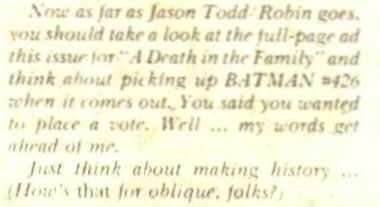
[ID: a letter sent in the same issue by Rick Hollingsworth (at 208 Hereford Drive, Steger, II. 60175). He wrote: ‘What's going on with the Jason Todd controversy? I'd like to place a vote that there be no Jason Todd in 'TEC. He has no place at all alongside the grim avenger of the night. Send the little Peter Pan to the Teen Titans or elsewhere and break the mold. From now on, it should be Batman and just Batman!’
The assistant editor Dan Raspler wrote back: ‘Now as far as Jason Todd Robin goes, you should take a look at the full-page ad this issue for “A Death in the Family” and think about picking up BATMAN #426 when it comes out. You said you wanted to place a vote. Well... my words get ahead of me. Just think about making history... (How's that for oblique, folks?)’ END ID]
#there was another answer like this in the letter column too#‘tune in to batman 426! you dont want to miss it and pass up your chance of making history! (what do i mean by that? time will tell!)’#and like sorry but i do think this is slightly funny#c: detective comics | i: 591#crypt's panels#.....#bruce & jason#<- it counts !!!! it counts !!!!!!!!
4 notes
·
View notes
Text
Today Is My Little Girl's 3rd Birthday⁉️

How sad that her childhood is living in the horrors of the ongoing WAR on Gaza, Palestine from 426 days.
What pains me the most is that she has lived through the horrors of this ongoing war on Gaza since she was a child, when she was only one year old.
She lived with us the suffering of displacement from our home to a tent that lacked all the basic necessities of life.
*Please 🔄share/Reblog our story.
*Write a short story about us & share it on your Tumblr page.
*Donate to us even a little it will save us.
💌gofund.me/cb8c05a3
Your Donation was very important because it will complete the costs of traveling from Gaza to a safe place & buying a small house to start our life in Once again.

👉Direct Donation Link
I want you to know that without you I'd haven't reached where I'm now, & without you I will reachen't safety & stability.🫂❤️🤍🇵🇸
🆘Please Take Action🆘
NOW‼️🕊️🕊️🕊️
➡️GFM Donation Link Here⬅️
✅My Account Was Verified & Listed #99
Please tagging for reach:
@tameggo @90-ghost @sayruq @batmananimated @batman @awakefor48hours @2spirit-0spoons @schoolhard @vampiricvenus @tamamita @omegaversereloaded @beetledrink @anneemay @beserkerjewel @appsa @apas-95 @fundraise-blog @gofundmereach-blog @artiston @generato-r @generationofawarenessblog @sabertoothwalrus @spongebobssquarepants @spongebob @unkillablemxnster @officialspec2 @ot3 @rickybabyboy @paper-mario-wiki @pcktknife @plum-sours @ankle-beez @postanagramgenerator @i-am-a-fish @afro-elf @lesbo @1eos @shesnake @akajustmerry @kibumkim @letshearitforthegoats-blog @onedollopofsourcream @khangerinedreams @womeninthemilitary @amazingphil @wmagazine @recaption @theanimalblog @understands @aid-childrens
Thank's A Lot ❤️
#free palestine#save palestine#palestinian genocide#i stand with palestine#all eyes on palestine#free gaza#artists on tumblr#ai generated#ai art#ai artwork#ai#children#childhood#send help#go fund me#fundraiser#mutual aid#palestine aid#ai artist#usa#united kingdom#ukraine#china#support#gfm#palestine gfm#gaza gofundme#gaza gfm
128 notes
·
View notes
Text








[Forget your faith in me. I took you with me because I was vain.]
batman: #367, #368, #368, #426, #426, #426, #408, #427 & doctor who
#drwhobatman posting because they make me feel unwell sorry thank you#(that's dick robin in the second to last btw. from when joker shot him)#jason todd#red hood#bruce wayne#batman#robin#web weaving
121 notes
·
View notes
Note
I know you don't really talk about Tim and Jason but I wondered why you said that Bruce likes Jason more then Tim when I always viewed it the other way around
og post in reference
Anon it's a such a coincidence for me to get this because this was something I actively debated over while creating the ranking.
In fact, originally I had written "4. Jason/Tim (tie?) 5. Tim/Jason (tie)" before I got rid of the slashes and ties.
This is the one part of the ranking that I'm most confused on/don't have an exact answer for. The rest are solid and those I'll be explaining in a different post soon but these two gave me a lot of confusion.
I think what it comes down to is in which shitty way that Bruce treats either of them expresses more love. And to me they're roughly the same in equally but different bad ways.
Bruce obviously loves Jason but he's also not remotely proud of him. His relationship with Jason is always "I love you BUT-" kinda relationship.
"You're good-

Batman (1940) Issue #415
BUT-"
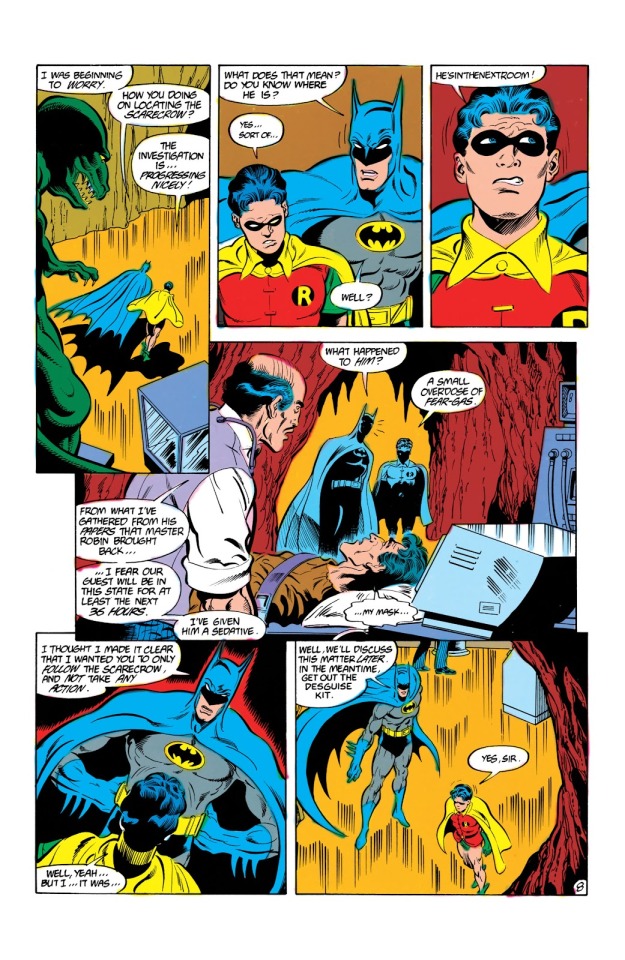
Batman (1940) Issue #415
"You're loveable-
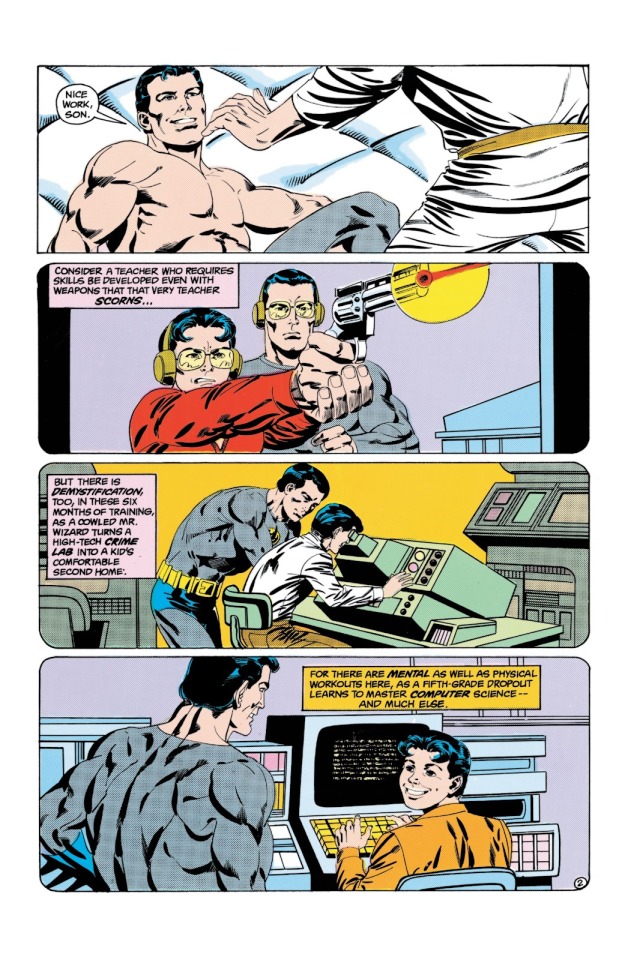
Batman (1940) Issue #410
BUT-"
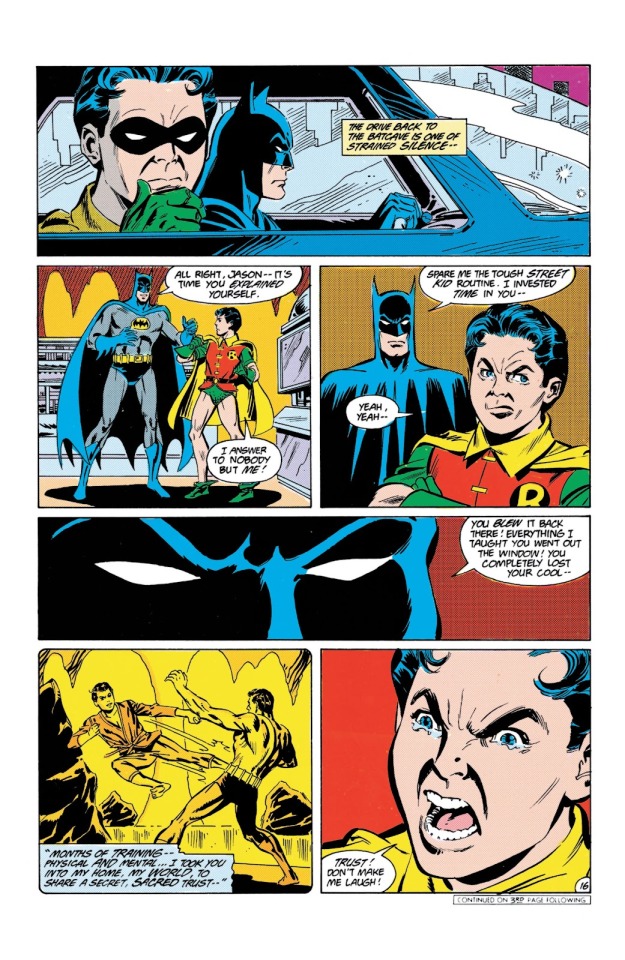
Batman (1940) Issue #411
There's always an opposing side to every good thing Bruce says about him. He views Jason as a failure but he still loves him and yet can't help putting him down. After Bruce dies, he leaves a message for Jason -
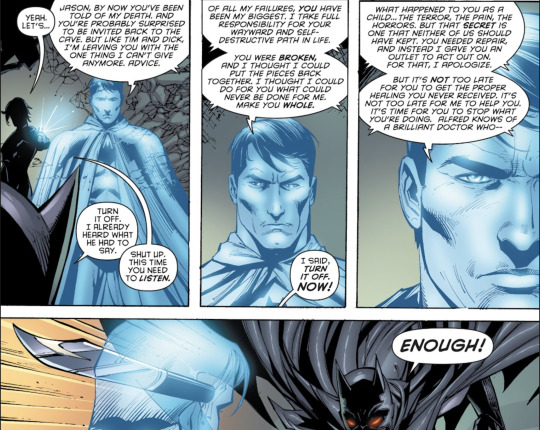
Batman: Battle for the Cowl Issue #3
Like Bruce full on treats him like absolute shit. How could you as a parent tell your son straight to his face that he's a failure and then say that it's your fault?? Somehow this is adding more insult than injury than to just blame him directly.
Bruce and Jason had good and bad times when he was Robin. There many times when Bruce was like "Good job, lab!" and other times when he struggled to deal with Jason. There was one case in particular that soured their relationship irrevocably. Things became really bad between them after that such that Bruce actively fights with himself not to lose his temper at Jason more than he used to.
For example:
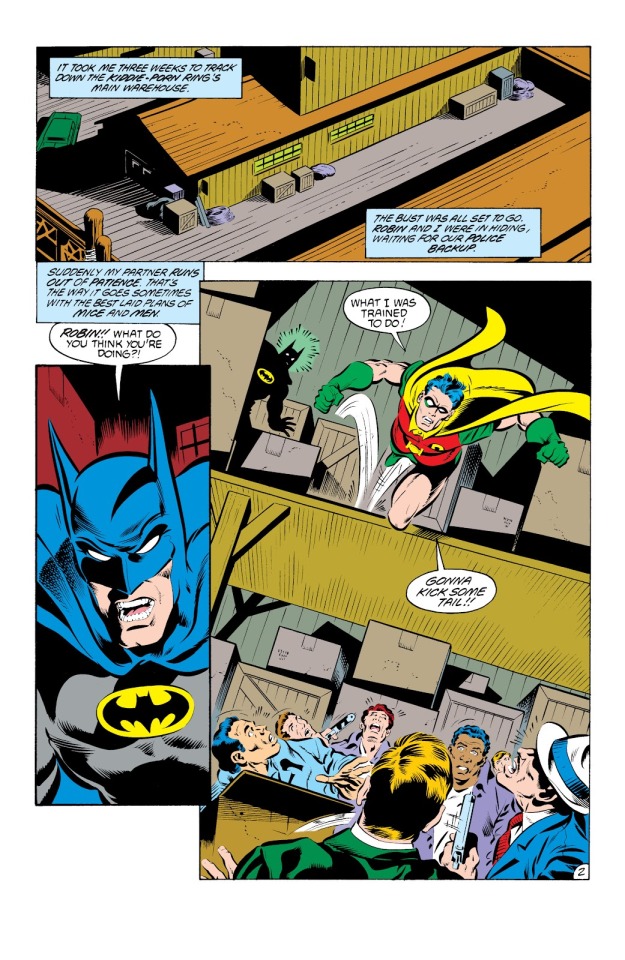
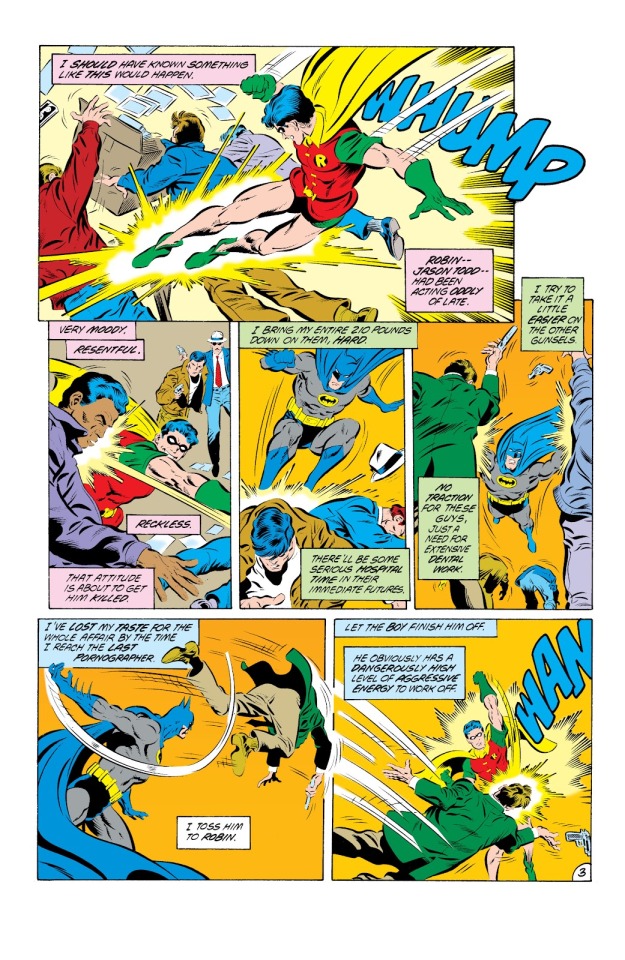
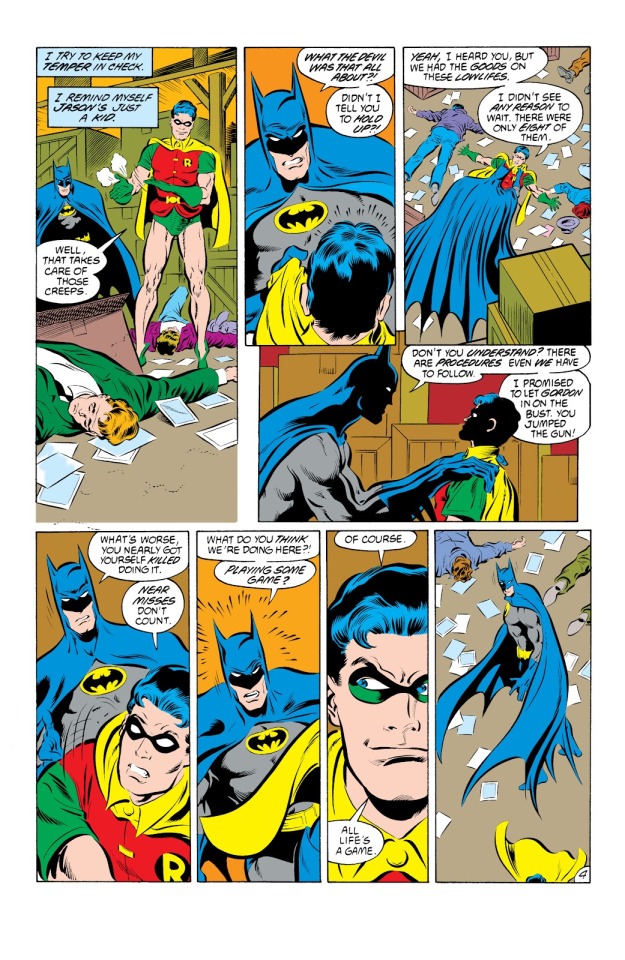
Batman (1940) Issue #426
Things get worse and worse, Batman benches him, Jason runs off to Ethiopia, and then you-know-what happens. In summary of their Robin-Batman relationship, Bruce thought he found a good partner in Jason, was happy for a while, but then started believing he made a mistake when Jason used the skills he taught him to go past the limits of what Bruce was acceptable with. The secret Bruce talks about is that one irreversible case I mentioned - Gloria/Felipe - where Jason killed a man. Or atleast Bruce suspects he killed a man.
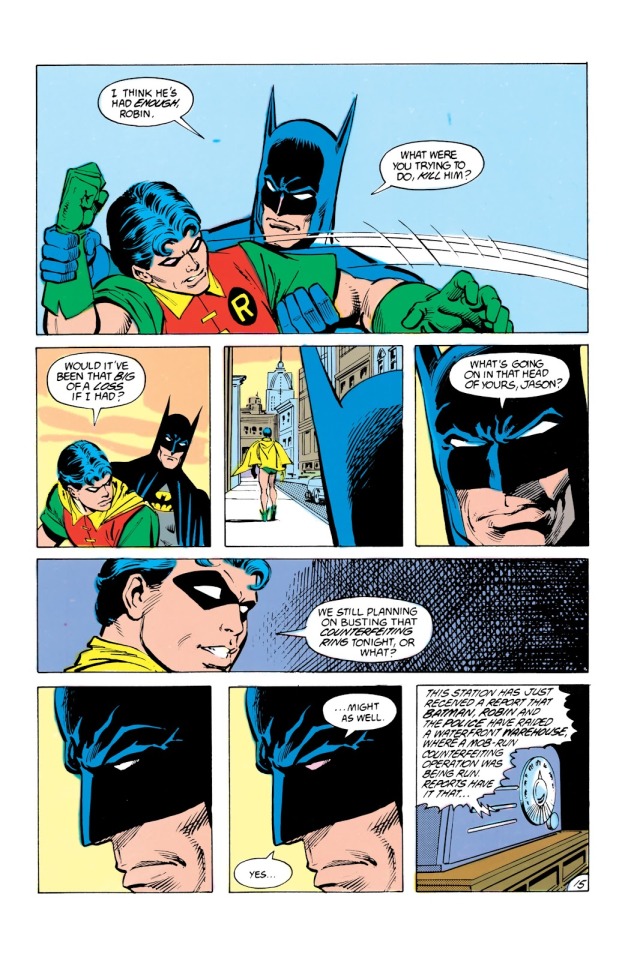
Batman (1940) Issue #422
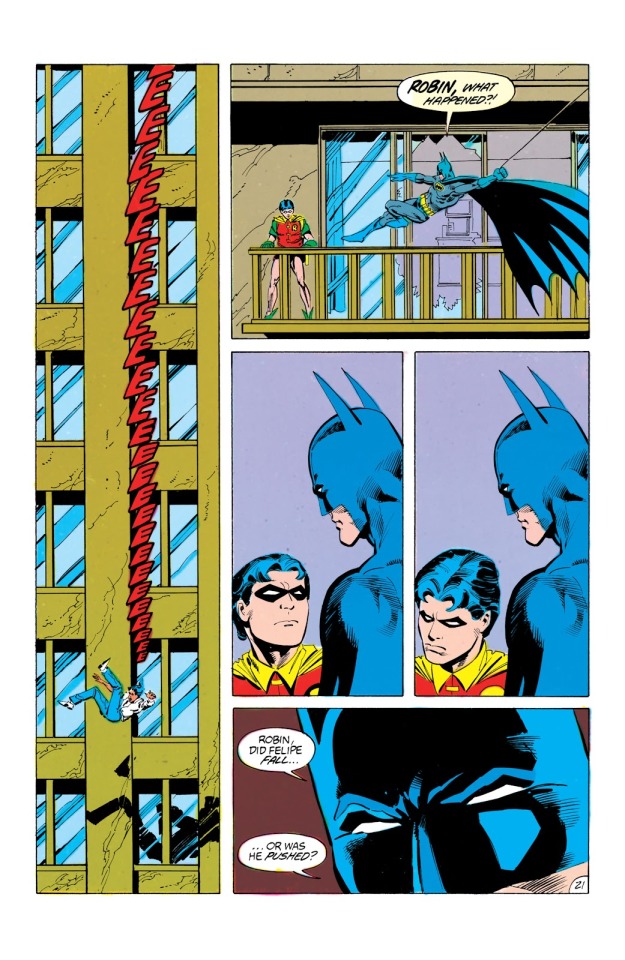
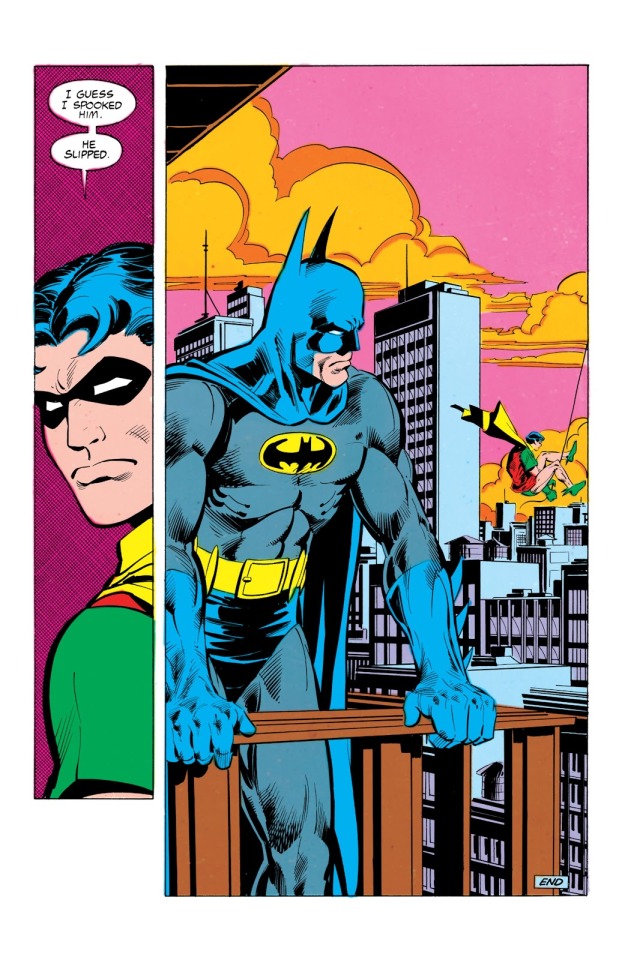
Batman (1940) Issue #424
When Jason came back as Red Hood, Batman felt so guilty for the fact that he made Jason robin because then Jason wouldn't have died but also believed that Jason was beyond saving. When Jason was at the hands of the society because of Black Mask who wanted revenge on him for what he did, Bruce almost let Jason die a second time - this time intentionally - before he changed his mind last minute and joined the fight to help him out.


Batman: Under the Red Hood Issue #10
It's this type of relationship I struggle with because Bruce very much loves him and even says so -

Batman: Hush Issue #11
But also guess what tips him off that he's not fighting Jason?

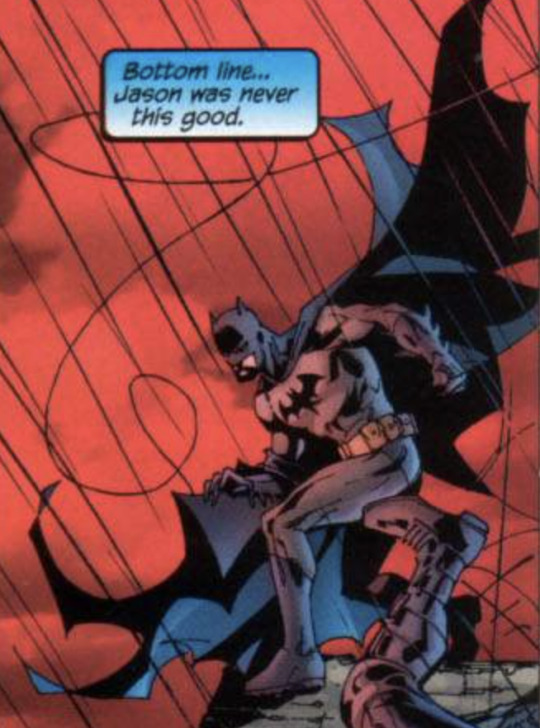
Batman: Hush Issue #11
I call this confusing but Dick calls this something else entirely.

Batman: Battle for the Cowl Issue #3
Tough love.
Maybe, but I guess how I would make out their relationship to be is: if Jason acts within Bruce's expectations, then Bruce loves him. If he doesn't then Bruce doesn't hold back hitting and punching. I don't think their relationship is tough love as much as it is conditional love. There are conditions to the way Jason must act in order for Bruce to love him and if he doesn't act that way then he stops caring about his son. He's happy if Jason comes to gatherings but doesn't particularly care if he doesn't. He leaves Jason alone if he follows his rules but actively goes after him if he doesn't. Both in his Robin days and now, Bruce doesn't tolerate Jason if he acts outside expectation but still loves him and although it's not the kind of love you would appreciate, it's also not the kind you can set aside and call it nothing. It's complicated. That's Jason and Bruce's relationship.
Tim on the other hand, he's very proud of. He thinks Tim is excellent, smart, dependable, and loves him very much.
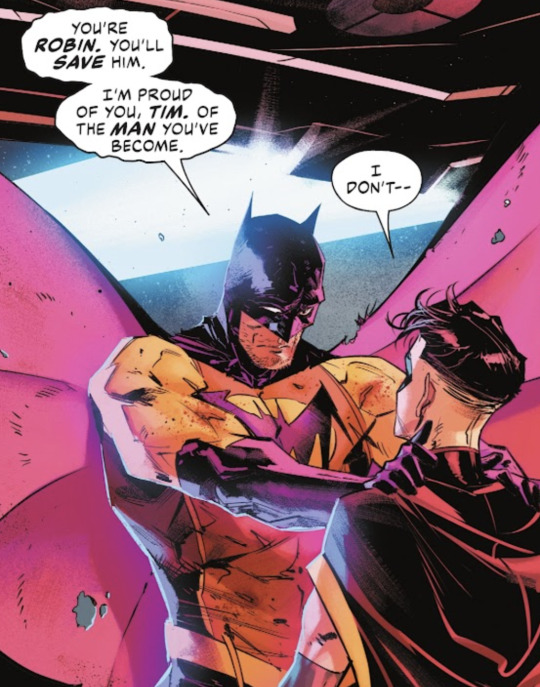
Batman (2016) Issue #128
But I feel like Bruce takes him for granted.
Bruce was both neglectful and very involved in Tim's life.
Bruce means a lot to Tim in the sense that he was a true father to him.

Batman (1940) Issue #480
Tim's dad Jack gets really worried that Tim might consider Bruce more of a father than him. "Maybe - But I'm your father, Tim. Not him!"
The developing relationship between Bruce and Tim was based originally on need. Bruce needed someone who he could work with and Tim needed someone who could be there for him. As time evolved that need turned into liking which turned into love.
After Jason, Bruce needed someone who listened to him completely. Someone who never questioned him or doubted his orders and Tim was everything Bruce needed and he loved that.
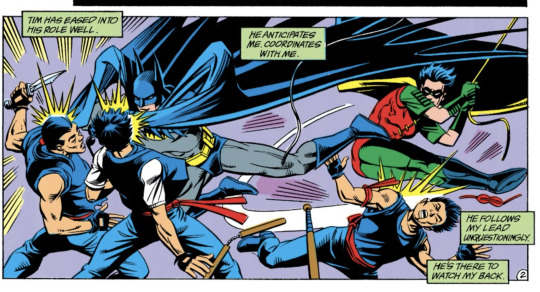
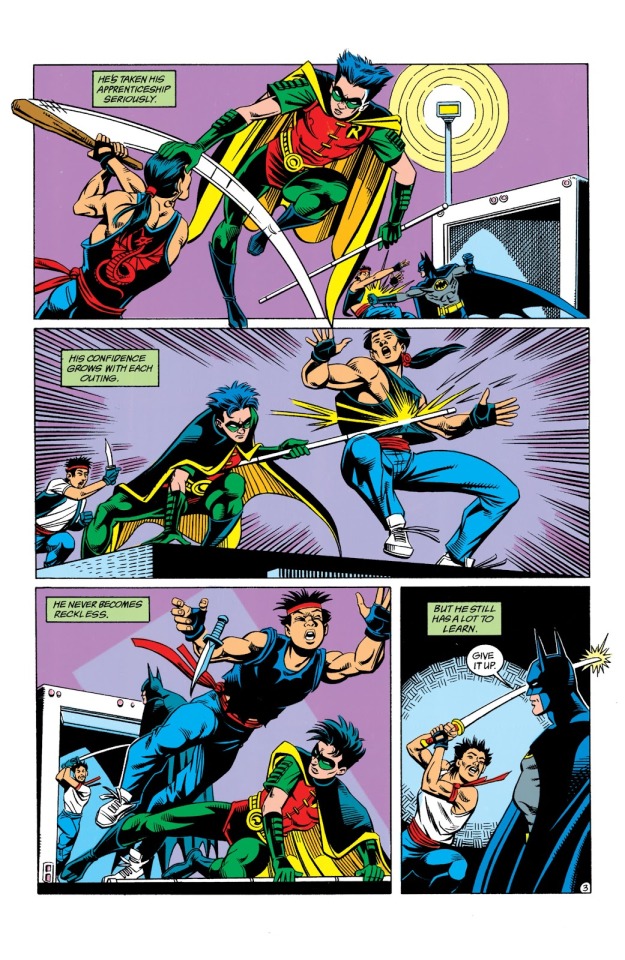
Batman (1940) Issue #467
Bruce invested a LOT of time into Tim's training and he also depends on him heavily but at the same time I feel like he constantly brushes off Tim's words and worries.
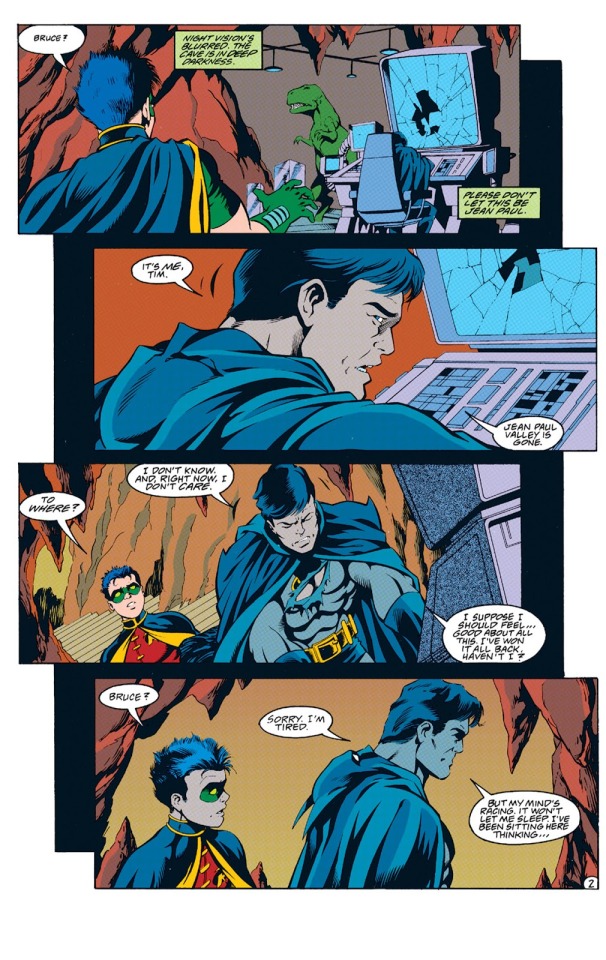
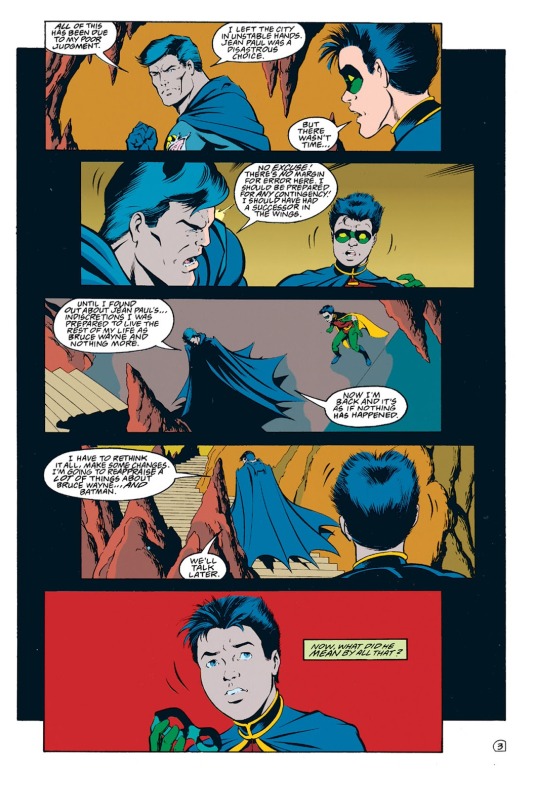
Robin (1993) Issue #9
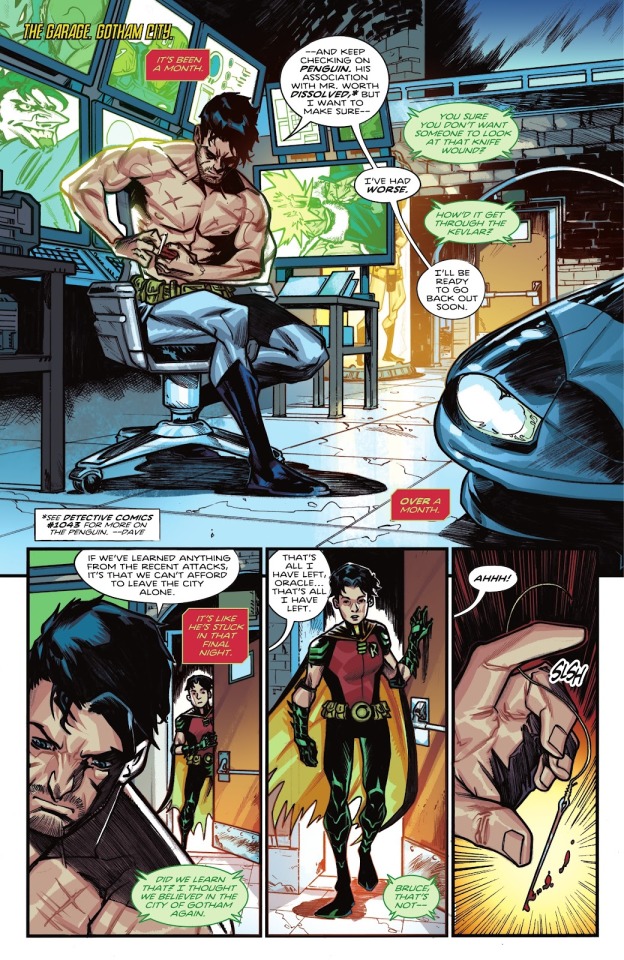
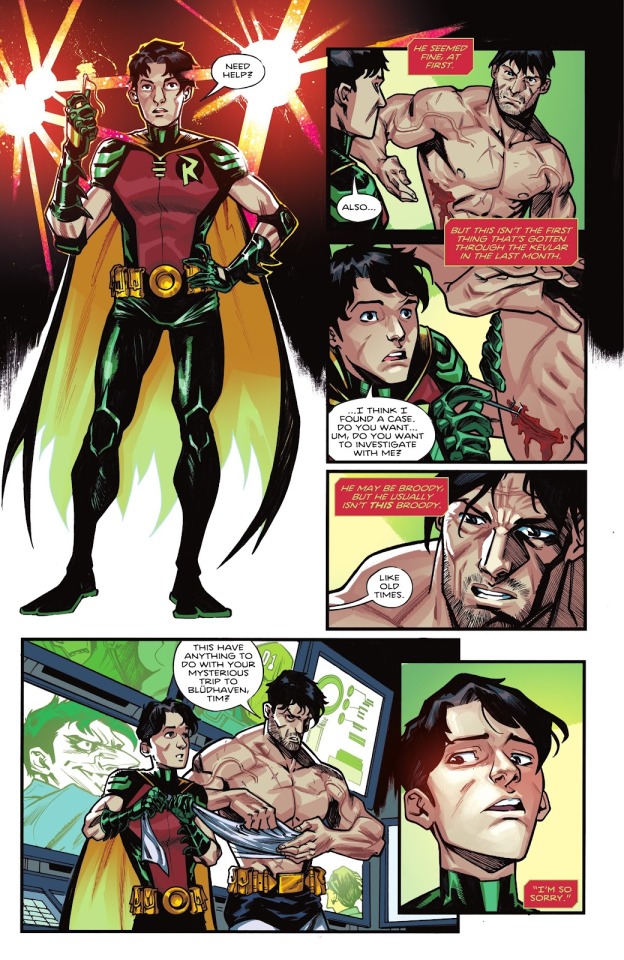
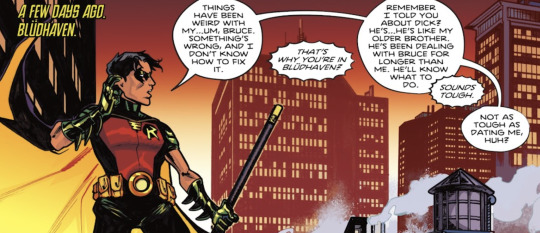
Batman: Urban Legends Issue #10
The classic "I trust you but I know better than you" x 10. And it's this thing that gives me doubts because I get this inexplicable sense of distance in their relationship. Bruce loves, trusts, and cares for him but I feel like there's something missing.
This being said, I realize that there's no clear explanation as to why I feel this way so I'll change the ranking back to "tie" for the two of them like I originally had. Because while Bruce loves Jason, he doesn't tolerate him and while Bruce loves Tim, he kinda disregards him in a way. And between these situations, I can't decide what represents more love or favoritism. I guess a part of me just felt really, REALLY bad for the way Bruce treated Jason. That post kinda shredded my heart so I gave him brownie points on the favoritism ranking list but in hindsight, after all this and writing it all out, I think Bruce loves Tim and Jason equally. It's entirely possible Bruce may actually love Tim more because unlike with Jason, I can't provide evidence of Bruce distancing himself from Tim in loving - only left with more of a sense. So in this case I agree with you, anon. It's very possible.
#jason todd#red hood#robin jason todd#tim drake#red robin#robin tim drake#bruce wayne#batman#dick grayson#nightwing#cl anon asks#cl asks#thanks for the ask!#this is the first time I've been completely unsure on something#tough but good ask anon#my brain has melted. I spent days on this and I'm still not any clearer
140 notes
·
View notes
Text
i often include some obscure symbolism in my fics without any real desire to point them out but i was rereading an old piece of mine and remembered one i was rather proud of;
it's from YOU MUST KNOW LIFE TO KNOW DECAY. which is a canon-adjacent story about jason's experience with rain throughout his life. it spans over many years, starting from before his parent's death, to the present as red hood.
the rain itself is the massive metaphor and motif, obviously, but within that i snuck in some other key aspects to jason's character. the one i want to talk about it from the second section of the fic (unofficially dubbed "No!" and the period in time where jason was homeless):

in this scene jason's belongings have been dumped out of his bag into the rain over a misunderstanding, amongst these scarce objects are two things — an old book belonging to Willis Todd, and a photograph of Catherine Todd (the one jason has at his place when bruce comes to find him in Batman (1940) #408).
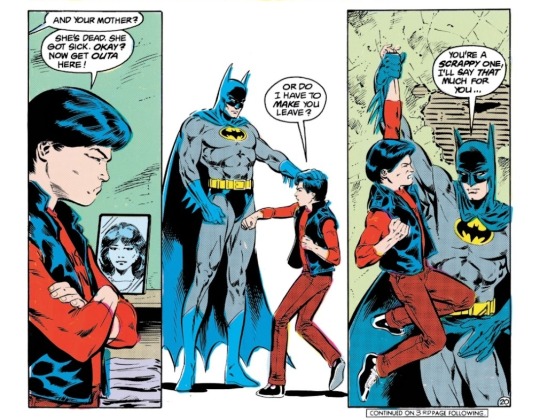
this photo always fascinated me and so i wanted to give it its own backstory. this moment however has two stories happening. a story of sacrifice for Willis, and the story of grief for Catherine.
the book willis used to love and jason remembers him reading often is the last remaining object the boy has to his father (because most of his belongings were left with his neighbour, and jason doesn't get those back until Batman (1940) #426).
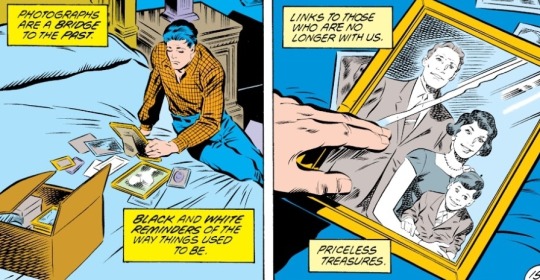
unlike a picture or a letter, this book is a vessel between them, nothing about it actually is Willis' other than the memory attached to it. a nod to the fact that even in death, he had nothing other than the memory he left with his family.
catherine however has a picture, something that is entirely hers, but even that is all it is; her face. jason is young when his mother dies, and as he grows up, he'll soon forget the memories he made with her, but he'll never forget her face because of this last photo he has. her existence, prior to the disease and suffering and death, is forever immortalised for jason. she exists only before her death.
neither willis nor catherine are ghosts that follow jason. he mourns them and misses them deeply (and this grief is the entire catalyst for why he runs away in A Death in The Family) — but they don't come to him when he's doused with fear toxin or battling exhaustion. he doesn't see them when he closes his eyes. because they are not concepts he mourns.
they are a book, a photo, people he has lost forever. jason being a young carer, would have had to watch his mother slowly die to her disease, so he knows death in its raw forms. i have spoken before about how jason views love and loss, as being very literal and blunt understandings, and it's the same here.
so, we have a book and a photograph.
the book being destroyed by the rain is another nod to the modern characterisation of Willis Todd (in both canon and fanon). of the explicitly abusive and negligent father. how his character being "ruined" is usually to paint catherine as the weak and pitiful victim of circumstance and nothing more. neither of them have any true personality other than their surface level one's, which are often classist and ignorant.
on the other hand, willis' book being ruined but protecting the photograph of catherine underneath is to represent his story in jason's life. he was an absent idea because he was working to provide for them, jason didn't really know him outside of this story, and willis dies as a mere idea for his family.
it's not enough, however. willis dies, but it's still raining. catherine's photo may have been saved by some of the rain, but jason is still homeless and he will still have to endure it alone.
the second section of this fic is the saddest one to me, because while jason is the only todd present in this scene, there are three stories being told.
123 notes
·
View notes
Text
The parallel that kinda kills me
If you know well The Diplomat's Son issue i suggest you skip to the fourth paragraph, because first three are just me yapping about it to give background to the point I'm making.
So, I think every Jason Todd enjoyer knows about the five issues that are significant to his death. One is obviously 'A Death in the Family' Batman #426 - #429, and the second is Batman #424, 'The Diplomat's Son', all written by Jim Starlin, known for his dislike of Jason as Robin.
Anyway. The thing is that The Diplomat's Son was supposed to prove that Jason is inadequate for the Robin's mantle, and threw him in a situation where Felipe Garzonas, the titular diplomat's son, who is rapist that drove one of his victims, Gloria, to suicide.
Jason is understandably frustrated and angry when he finds out Felipe Garzonas has diplomatuc immunity. Batman is all like 'we can't do anything, just collect evidence yada yada yada'. Jason is fed up with it. So he goes to confront Felipe, and the scene ends wuth Felipe falling to ground and dying. Whether Jason pushed him (he denied it) or slipped (like Jason said was), we don't know. Honestly, I have many things to say about it and got a draft of the post on the topic.
But the point is - Jason was confronted with powerlessness at Garzonas's immunity. And here we go with the parallel. In 'A Death in the Family', Joker becomes Iranian ambassador, and get's an immunitet.

Honestly, I don't think it's something Starlin did on purpose, although who am I to know. The thing is, Bruce get's pissed. He can't take it, and straight up is the reason a helicopter with Joker and himself explodes. They both live of course, but the fact it, Bruce is a goddamn hypocrite. The difference is what made them tick. And like, there is a big possibility Jason would ignore Joker's immunitet just as fast if it was Bruce who died, but it's not the point. The point is, Jason's reason to (supposedly) ignore it and (supposedly) kill someone are selfless in a way. His personal experiences made him really sensitive to crimes against children and women, and it was portrayed as a bad thing. His willingness to ignore Batman's orders and Garzonas' immunitet were because of empathy and anger at the system that let people get away with shit like that. Bruce was clearly against it. Was he numb to Gloria's death? Obviously no. But he was not willing to break the law in so risky way as to beat up a guy protected by international law. And yet when it was a personal reason, he jumped straight at it. And of course there are all the emotions with you know, having your son killed by said guy with immunited, but is was the same for Jason. I just can't get over it. Because Starlin may have wanted to make Jason look like an aggresive thug, but what he menaged to do is show Bruce's emotional unavailiblessness and hypocrisy.
#batman#dc comics#dc#jason todd#robin#bruce wayne#batman comics#comics#a death in the family#the diplomat's son#Jason todd's death#character meta#meta analysis#comic analysis#batman meta#jason todd meta#parallels#text post#comic panels#onnahu's thoughts about jason
57 notes
·
View notes
Text


Propaganda under the cut

27 notes
·
View notes
Text
Tumblr in Gotham
------------------------------------------------------------------------------
🧠?~Riddle~Master~? FOLLOW ...
Notes- 440
------------------------------------------------------------------------------
👨🌾Doctor-Jonathan-Crane FOLLOW ...
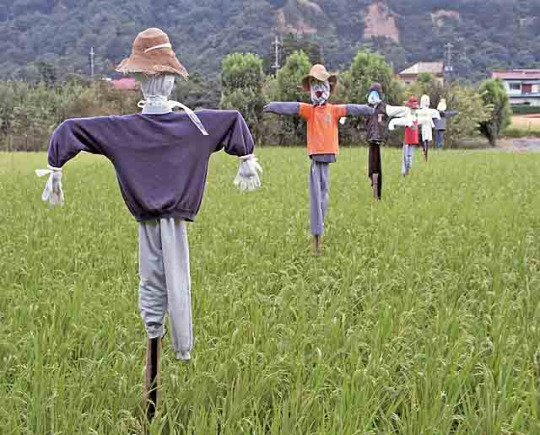
me and my lab partners
Notes- 3
------------------------------------------------------------------------------
🚔Lock-Up-The-Criminals-!!!! FOLLOW ...
Criminals suck, like if you agree
🦇Dark-Knight-1940 FOLLOW ...
They still deserve sympathy though.
🚔Lock-Up-The-Criminals-!!!! FOLLOW ...
I HATE YOU I HATE YOU I HATE YOU I HATE YOU I HATE YOU I HATE YOU I HATE YOU I HATE YOU I HATE YOU I HATE YOU I HATE YOU I HATE YOU I HATE YOU I HATE YOU I HATE YOU I HATE YOU I HATE YOU I HATE YOU I HATE YOU I HATE YOU I HATE YOU I HATE YOU I HATE YOU I HATE YOU I HATE YOU I HATE YOU I HATE YOU I HATE YOU I HATE YOU I HATE YOU I HATE YOU I HATE YOU I HATE YOU I HATE YOU I HATE YOU I HATE YOU I HATE YOU I HATE YOU I HATE YOU I HATE YOU I HATE YOU I HATE YOU
🦇Dark-Knight-1940 FOLLOW ...
jesus christ, dude
Notes- 217
------------------------------------------------------------------------------
😡Gayson-Todd FOLLOW ...
who changed my name?
🤡Clown-Prince-#1 FOLLOW ...
AHAHHAHAHAHHAHAHAAHAHHAHAHAHHAHAHAHHAHAHAHAHAHHAHAHIU9FSUHHUAFHSHSHAFHUIASFHUAHUIOSFHIOUASHUOIFAHUIOSFHUIOASHFUIAHUSFHAFS
Notes- 426
------------------------------------------------------------------------------
🤡Clown-Prince-#1 FOLLOW ...
So whos the best robin???
🦇Dark-Knight-1940 FOLLOW ...
dont.
Notes- 5
------------------------------------------------------------------------------
🦇Dark-Knight-2019 FOLLOW ...
I found a time machine
🦇Dark-Knight-1940 FOLLOW ...
what the fuck
⚔Saint-Dumas-Pawn FOLLOW ...
well that cant be right
🦇Dark-Knight-1940 FOLLOW ...
What. The. Fuck
🦇Thomas-Wayne-Batman FOLLOW ...
obviously, because im batman
🦇Dark-Knight-1940 FOLLOW ...
WHAT IS HAPPENING????
Notes- 6
------------------------------------------------------------------------------
🐦BEST-ROBIN-#5 FOLLOW ...
this close to revealing his secret Identity istg
🤵Pennyworth-1 UNFOLLOW ...
please just clean your room, master robin
Notes- 1
------------------------------------------------------------------------------
😡Gayson-Todd FOLLOW ...
no seriously, who was it?
Notes- 429
------------------------------------------------------------------------------
👨⚕️The-Other-Doctor-Strange FOLLOW ...
In my asylum, straight up performing it. And by it? well lets just say, medical malpractice
Notes- 18102011
------------------------------------------------------------------------------
🧟♂️solomongrundybornonamonday FOLLOW ...
solomongrundybornonamonday
🐊Killer-Croc-Morgan FOLLOW ...
GET OUT OF MY FUCKING SEWER
Notes- 1996
------------------------------------------------------------------------------
⚡Zeus-God-of-Gods FOLLOW ...
im a god btw
❄DOCTOR-Freeze FOLLOW ...
you're not a god, you're an adult man
⚡Zeus-God-of-Gods FOLLOW ...
im. a. god. ⚡⚡⚡⚡⚡⚡⚡⚡⚡⚡⚡⚡⚡⚡⚡⚡⚡
❄DOCTOR-Freeze FOLLOW ...
❄❄❄❄❄❄❄❄❄❄❄❄❄❄❄❄❄❄❄❄❄❄❄❄❄❄❄❄❄❄❄❄❄❄❄
Notes- 483
------------------------------------------------------------------------------
👩⚖️District-Attorny-1 FOLLOW ...
so glad theres no evil version of me on tumblr
👿Big-Bad-Harv FOLLOW ...
yeah sure
👩⚖️District-Attorny-1 FOLLOW ...
who was that?????
👩⚖️District-Attorny-1 FOLLOW ...
WAIT WHO WAS THAT?????????????
Notes- 117
------------------------------------------------------------------------------
🤡Harley-Queen-#1 FOLLOW ...
green always reminds me of them
🤡Clown-Prince-#1 FOLLOW ...
oh thanks, harls
🤡Harley-Queen-#1 FOLLOW ...
I WASNT TALKING ABOUT YOU
Notes- 147
------------------------------------------------------------------------------
💲Billionaire-Playboy-Philanthropist-Bruce-T-Wayne FOLLOW ...
I own tumblr btw
Notes- 1
------------------------------------------------------------------------------
🎩Jervis-through-the-looking-glass FOLLOW ...
⏰
oooooooooooooo you want to do a stage play of alice through the looking glass with me ooooooooooooooo
🧱Basil-Karlos-Acting-Tumblr FOLLOW ...
no, the fuck, I do not
Notes- 10/6
------------------------------------------------------------------------------
🦇Bat-WOMAN FOLLOW ...
IM NOT BATGIRL, FOR FUCK SAKE. BATGIRL SUCKS
🦇Bat-Girl FOLLOW ...
bro...
Notes- 223
------------------------------------------------------------------------------
🔥IM-FIREFLY FOLLOW ...
🔥
🔥Fire_Bug-2 FOLLOW ...
🔥
Notes- 4
------------------------------------------------------------------------------
💀My-Mask-Is-Black FOLLOW ...
reblog if you would take a bribe from me
notes -
👮♂️Harvey-Bollocks FOLLOW Reblogged ...
👮♂️Harvey-Bollocks FOLLOW Reblogged ...
👮♂️Arnold-Flass FOLLOW Reblogged ...
👮♂️Harvey-Bollocks FOLLOW Reblogged ...
👮♂️Harvey-Bollocks FOLLOW Reblogged ...
🦇Dark-Knight-1940 FOLLOW ...
@ commissioner_gordon#1
👮♂️James-Gordon-the-first FOLLOW ...
what the actual fuck
👮♂️Arnold-Flass FOLLOW ...
oh shit.
Notes- 441
------------------------------------------------------------------------------
🌙Knight-of-the-moon FOLLOW ...
I dont think im supposed to be here
Notes- 32
------------------------------------------------------------------------------
🧱Basil-Karlos-Acting-Tumblr FOLLOW ...
this face cream feels weird
🧱Basil-Karlos-Acting-Tumblr FOLLOW ...
oh fuck...
Notes- 40
------------------------------------------------------------------------------
🤫 shoosh-its-a-spoiler FOLLOW ...
cluemaster was better than the riddler ngl
🧠?~Riddle~Master~? FOLLOW ...
SHUT UP
Notes- 647
------------------------------------------------------------------------------
🐱👤League-of-Assassins-Admin FOLLOW ...
im coming to gotham soon btw
🐦BEST-ROBIN-#5 FOLLOW ...
dont you fucking dare
Notes- 42017
------------------------------------------------------------------------------
👮♂️James-Gordon-the-first FOLLOW ...
someone broke the fucking signal
🔦the-dukester FOLLOW ...
WHAT
👮♂️James-Gordon-the-first FOLLOW ...
you really need to change your name
Notes- 21
------------------------------------------------------------------------------
💪Venom-guy-#1 FOLLOW ...
you guys remember when I broke the bat?
🦇Dark-Knight-1940 FOLLOW ...
delete this
Notes- 1993
------------------------------------------------------------------------------
📅Calendar-enthusiast FOLLOW ...
@albertofalcone-holiday-killer stole my thing
📅Holiday-enthusiast FOLLOW ...
you're just mad bc I did it better
Notes- 259
------------------------------------------------------------------------------
☂Corn-on-the-Cobblepot FOLLOW ...
SHE TOOK MY FUCKING UMBRELLA
Notes- 58
------------------------------------------------------------------------------
🐱Cat-Burglar FOLLOW ...
just found this totally awesome umbrella sitting in an alleyway
Notes- 1
------------------------------------------------------------------------------
🍝jade278 FOLLOW ...
how did I get here?
Notes- 278
------------------------------------------------------------------------------
#jade278#batman#gotham#batman dc#bat family#riddler#catwoman#penguin#calender man#holiday killer#long halloween#bane#jim gordon#duke thomas#ras al ghul#Damien wayne#spoiler#steph brown#clayface#basil karlo#arnold flass#harvey bullock#black mask#firefly#firebug#batwoman#kate kane#barbara gordon#batgirl#bruce wayne
27 notes
·
View notes
Note
Could you give me any Batman comic(/series) recommendations? Or Joker ones?
(You can pretend I’ve never read any Batman comics)
Man, this got me thinking about (1) the number of extended storylines I still haven't fully read myself and (2) of the ones I have, would I recommend that people read them?? Tough question! Thinking about it in terms of a Batman newbie changes things too... 🤔
Ultimately, my list is mostly one-offs apart from the mainline series, but there's a few multi-issue mainline stories in there. From oldest to newest:
Batman (1940) #1, "The Joker" and "The Joker Returns" — Early comics can feel inaccessible because of their age, but I would still recommend checking out the start of Batman and Joker's relationship for a sense of the longevity and evolution of these characters (You could also read Batman's first appearance in Detective Comics [1937] #27.)
Batman (1940) #251, "The Joker's Five-Way Revenge" — Jumping ahead thirty years! After a 4-year absence from comics, Joker returns, and I just love how his dynamic with Batman picks up where they left off like it was yesterday.
Detective Comics (1937) #475, "The Laughing Fish" — The infamous story in which Joker's mad scheme is to… copyright fish.
The Dark Knight Returns #1-4 — TBH, I'm not a fan of TDKR for various reasons. However, it had a huge influence on Batman and you should read it at least once.
Batman (1940) #404-407, "Batman: Year One" — More required reading (but I do enjoy it more than TDKR). Frank Miller's problematique is more acknowledged today, but as I said, modern Batman stems from his work.
The Killing Joke — Controversial-ish recommendation nowadays, considering the much-maligned choice to fridge Barbara Gordon, but I still enjoy the nuance it gives Joker and the meta element of the ending, with Bruce and Joker trapped in their cycle by choices that are informed by the needs of the franchise. Alan Moore may no longer care for it, but I do! (Also, I'd say read it with the original coloring.)
Batman (1940) #426-429, "A Death in the Family" — Another big event in Batman lore: the death of Jason Todd. It's one of those moments that gets flattened in various ways today, so I think it's important to see how everything actually played out. In particular, it's striking to see that Joker is initially nervous about Batman finding out what he did, and just how Bruce struggles with his no-kill principle.
Batman #450-451, "Wildcard!" and "Judgements!" — Joker's big return after Jason's murder, in which we see he's still not all that giddy about it.
Batman: Legends of the Dark Knight #65-68, "Going Sane" — This story takes place earlier in Batman's career, before Robin. When Joker seemingly kills Batman, he tries to start a new life without his instability breaking through. Meanwhile, Bruce recovers from his near-death in a little town in the middle of nowhere and thinks he might actually stay there… but he's plagued by restlessness too.
Joker: Devil's Advocate — Joker winds up on death row, but for a crime he didn't commit! Bruce is set on proving Joker's innocence despite the clown's other sins, and Joker is too captivated by all the media attention to help save his own hide.
Deathstroke (1991) #58, "Bad Blood" — A story in which Joker causes plenty of chaos, but in service of doing something… nice?
Batman: Ego — As Bruce contemplates giving up his crusade, he falls into an argument with… Batman.
Batman (1940) #648-650, "All They Do Is Watch Us Kill" — Part of Under the Red Hood. Jason Todd's reappearance in Gotham City comes to a head when he kidnaps Joker and draws Batman in for a dire confrontation.
Detective Comics (1937) #826, "Slayride" — Paul Dini is one of the writers who consistently remembers Joker has a personality and makes him funny, and this Christmas-time story featuring Tim Drake is a great example.
Batman Confidential #7-12, "Lovers and Madmen" — An alternative origin for Joker. Bruce has been fighting crime for about a year when he encounters a bloody crime scene that he can't make sense of. Meanwhile, the culprit, Jack, is growing bored with his criminal life, until he comes face to face with a vigilante bat.
Batman 80-Page Giant 2010 (Volume 2), "Reality Check" — Is Joker really crazy? Does Joker himself even know?
Batman (2011) #13-17, "Death of the Family" — Not to be confused with "A Death in the Family." Joker tries to convince Batman that all his sidekicks make him weak.
Batman (2011) #23.1, "Time to Monkey Shine" — Joker infamously adopts a gorilla. (It ends badly.)
Batman (2011) #35-40, "Endgame" — After Joker's failure in DOTF, he decides to bring his conflict with Batman to a close.
The Joker Presents: A Puzzlebox #1-7 — The Riddler is dead, but what really happened? A heist story in which the point of view is passed around multiple rogues, but Joker is the ringleader.
Catwoman: Lonely City #1-4 — Alright, this one does revolve around Selina, but the story is deeply tied to her relationship with Bruce and what she comes to understand about him in the end. (And Joker plays a brief but key part!)
Batman & The Joker: The Deadly Duo #1-7 — A recent team-up that calls back to everything I've personally enjoyed about Batman and Joker's dynamic.
Batman: City of Madness #1-3 — Beneath Gotham lies Gotham Below, from which a monstrous mirror of Batman escapes in search of a Robin. In his pursuit, Bruce confronts not only alternative versions of his rogues but his personal demons.
45 notes
·
View notes
Text

I love how Alfred continuously had the maturity to see things from Jason's side. He really loves Jason a lot 😭
From Batman (1940) #426
#jason todd#alfred pennyworth#red hood#batman#robin#bruce wayne#friendship with bruce ended. alfred is now jason's only legal guardian
65 notes
·
View notes
Text


"...ON SALE IN SEPTEMBER." -- THE CAPED CRUSADER MEETS THE INFERNAL OCCULT IN THE '80s.
PIC(S) INFO: Spotlight on a DC Comics house ad for "Batman" Vol. 1 #426 & #427 (published August & September 1988, respectively), then promoting the "Batman: A Death in the Family" storyline.
PIC #2: Another horizontal DC house/print advertisement -- "Hellblazer" Vol. 1 (#'s 10-16, 1988-'89), introducing English artist Richard Piers Rayner on the John Constantine title.
Source: https://forum.sanctuary.fr/t/page-s-de-pub/185608/225.
#Batman#Hellblazer#John Constantine#Hellblazer John Constantine#DC Comics#The Dark Knight#The Caped Crusader#DC House Ads#House Ads#Adverts#DC Universe#Occult#Gotham City#1980s#80s DC#Comics#Comic Books#Constantine#Illustration#Batman: A Death in the Family#1988#1989#John Constantine Hellblazer#Advertisements#Richard Piers Rayner#A Death in the Family#Print Ads#British Comics#Batman Vol. 1#DC
42 notes
·
View notes
Text
im so confused was jason actually fired from being robin or not—
cause in the batman #426 it was only discussed between bruce and alfred? and jason just overheard, no?
26 notes
·
View notes